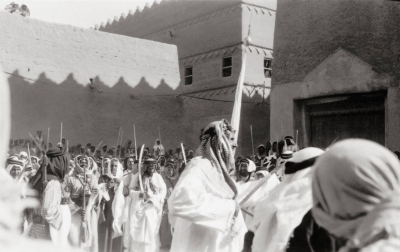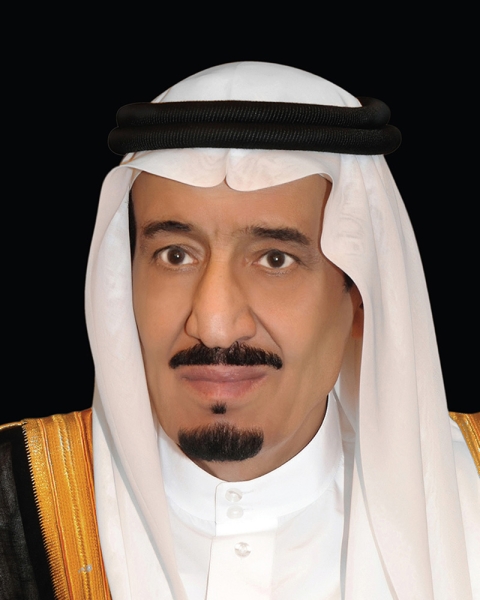
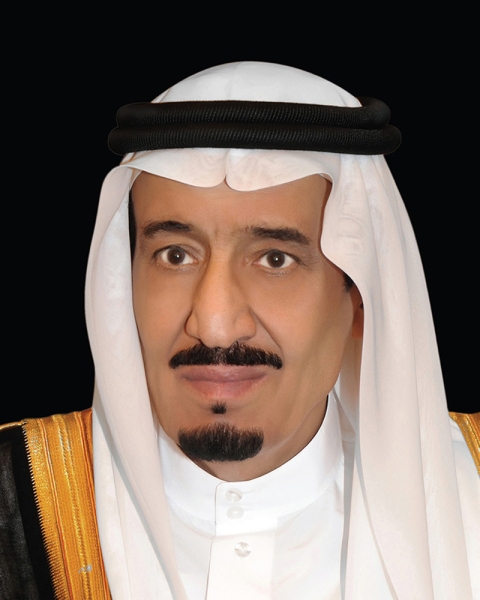
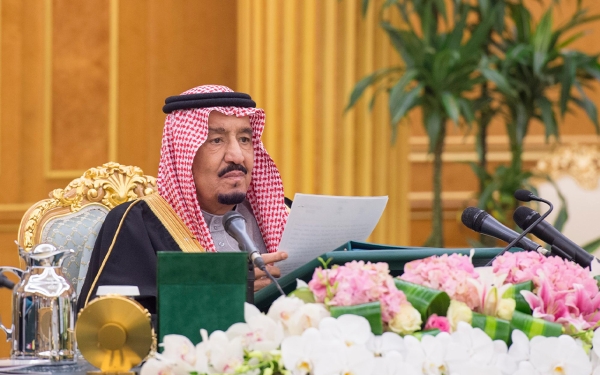
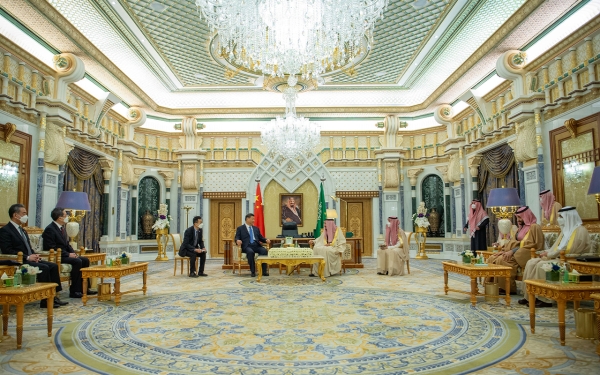
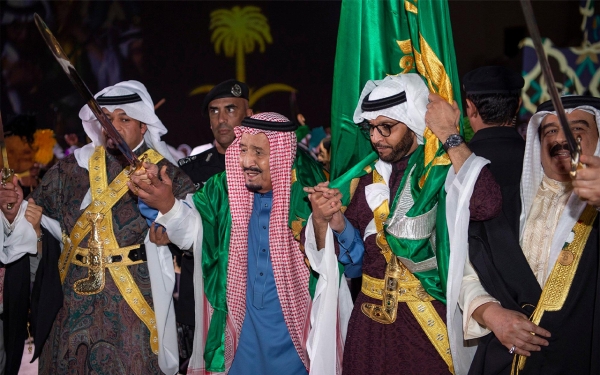
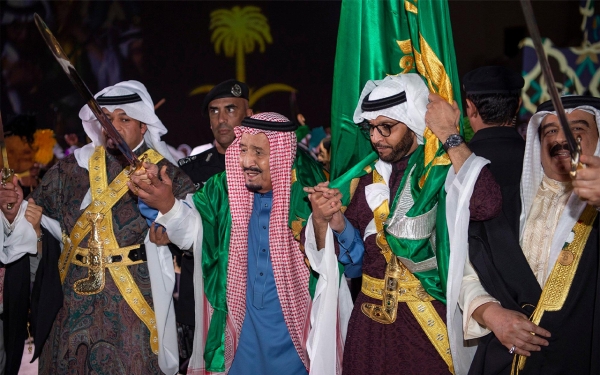
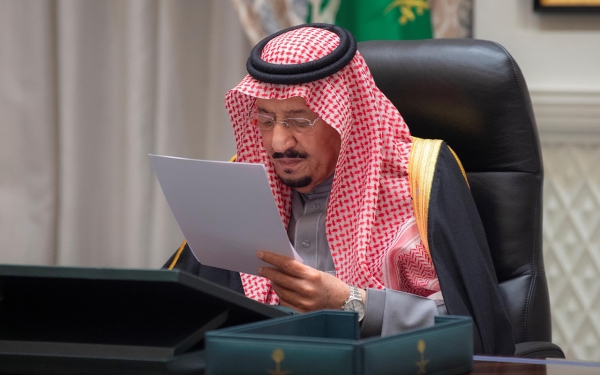
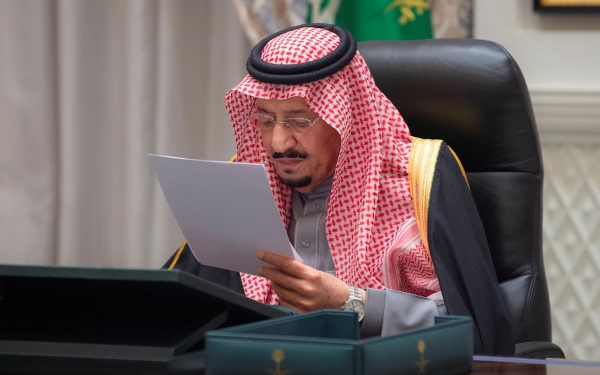
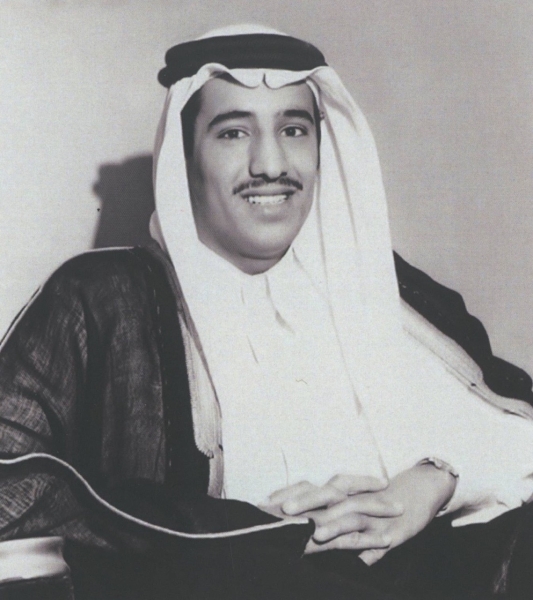
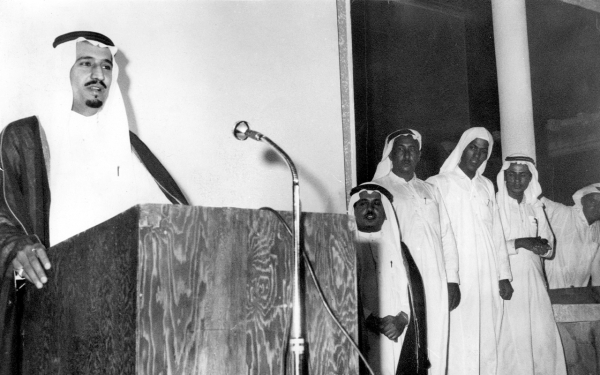
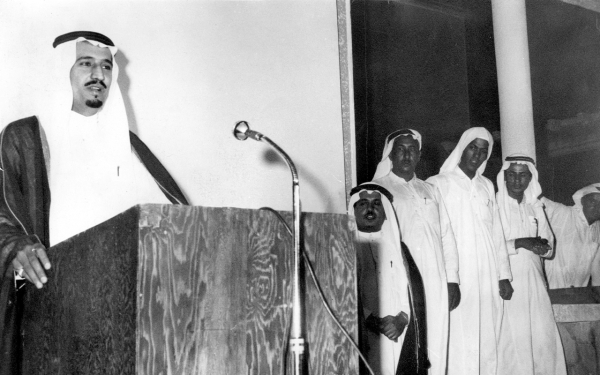
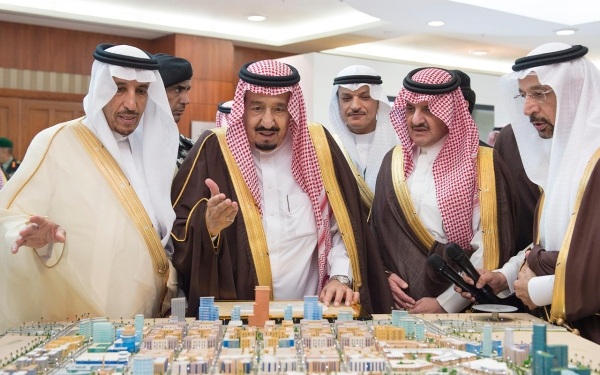
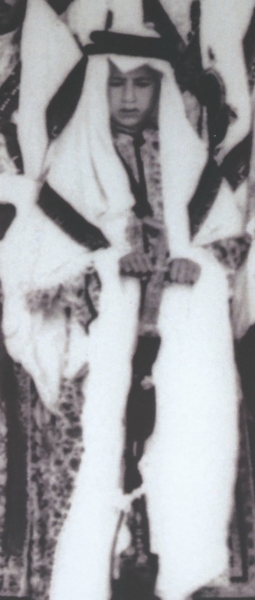
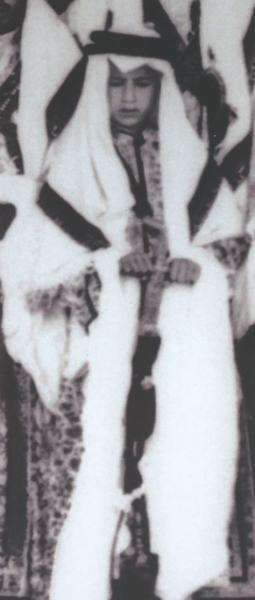
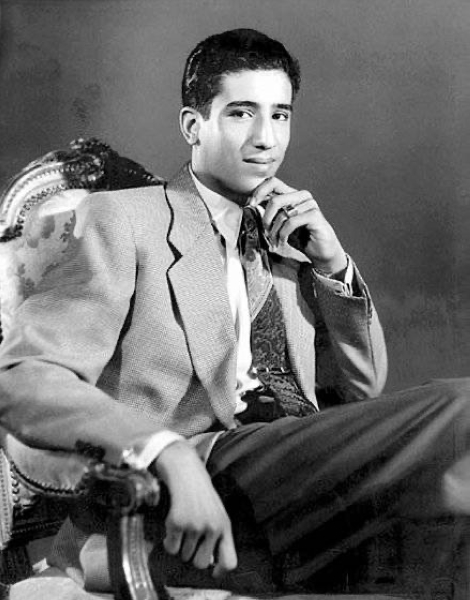
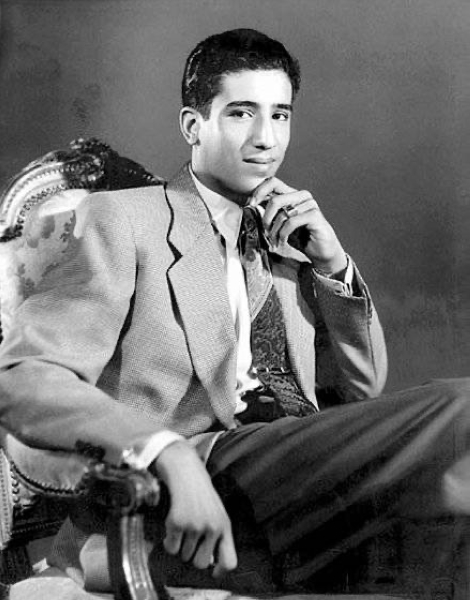
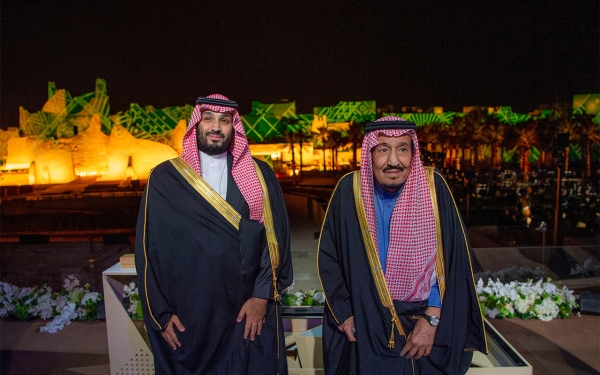
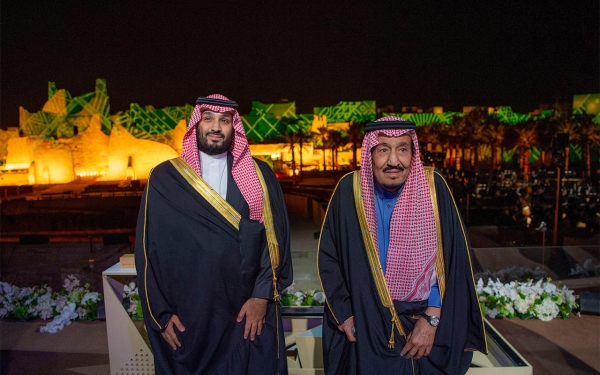
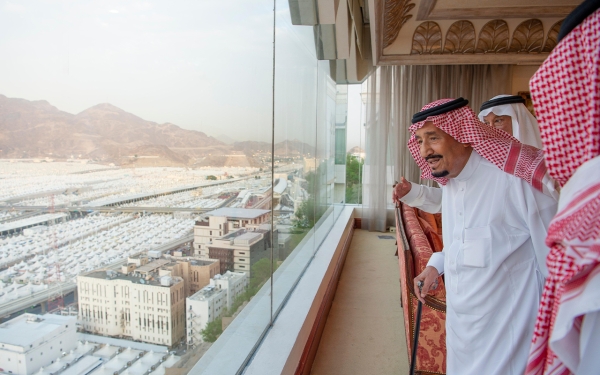
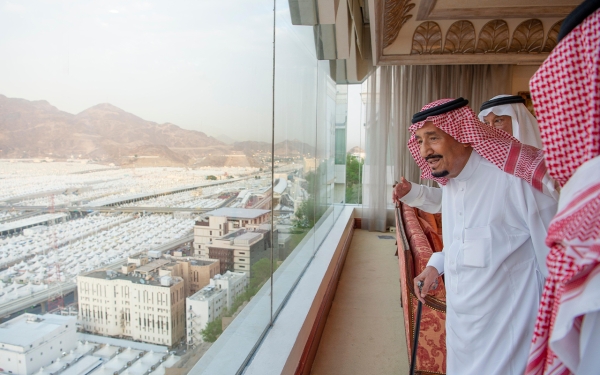
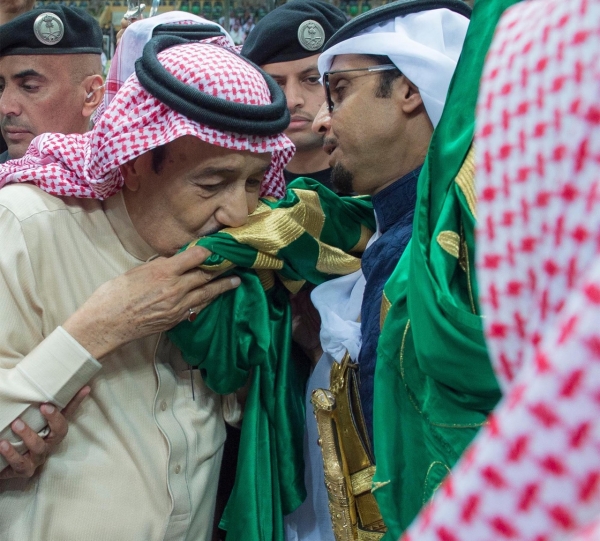
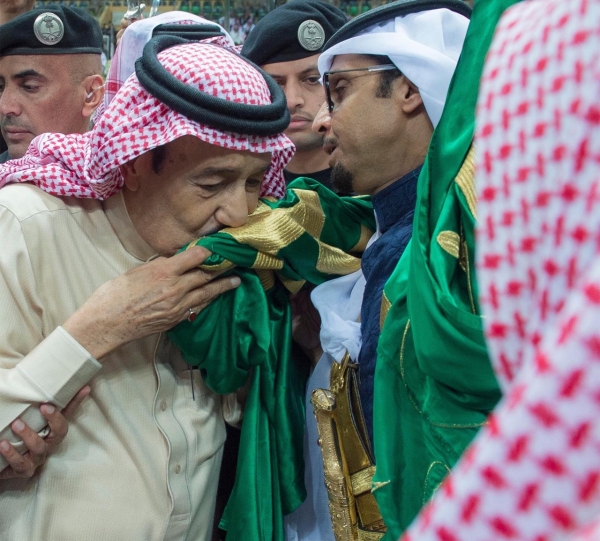




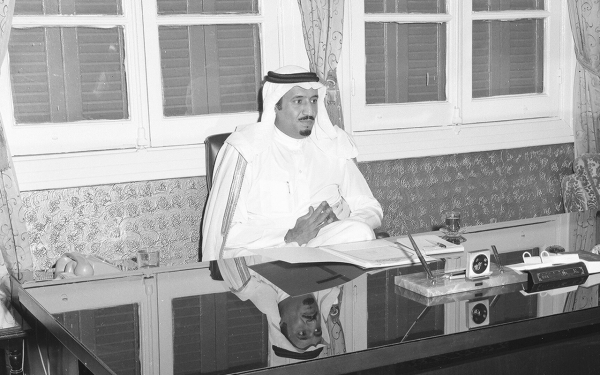
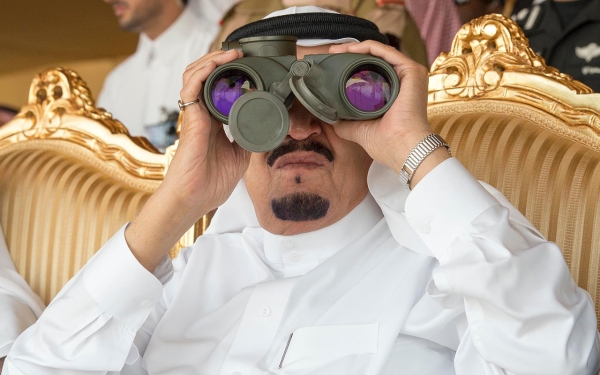
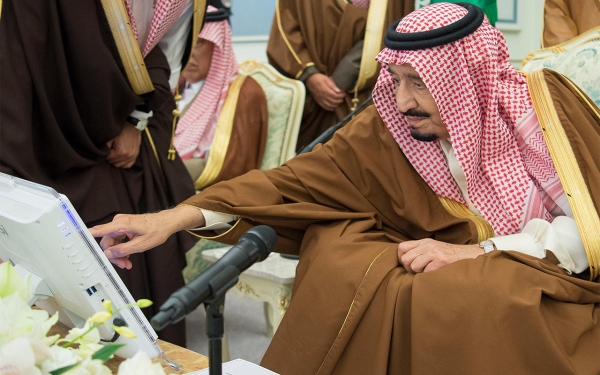
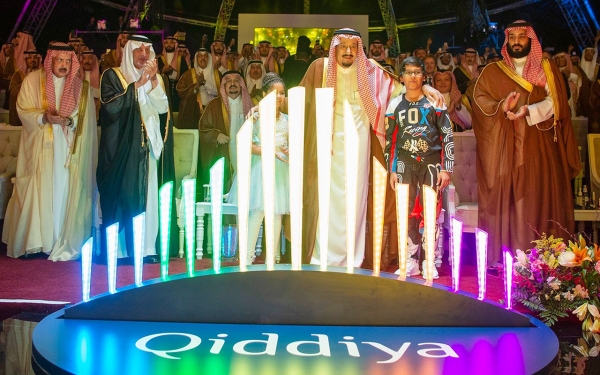
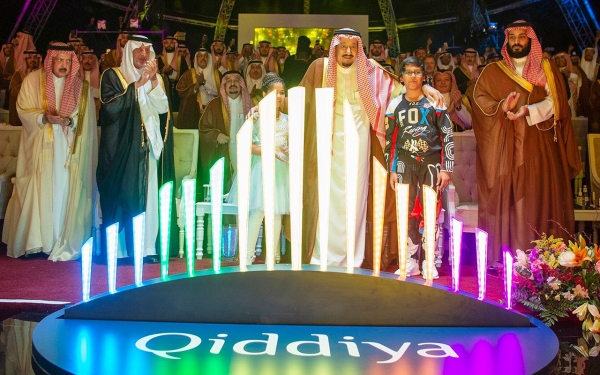
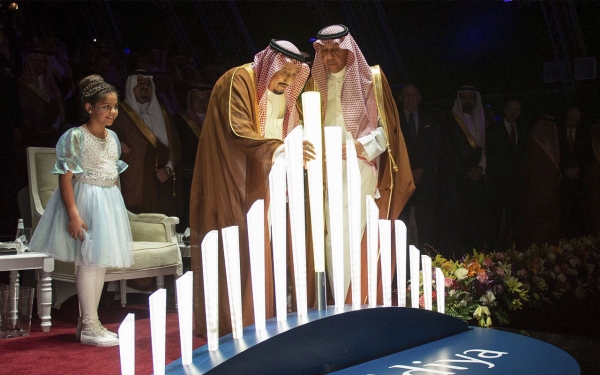
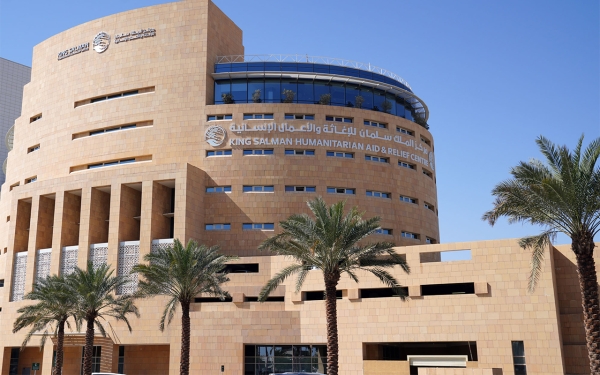
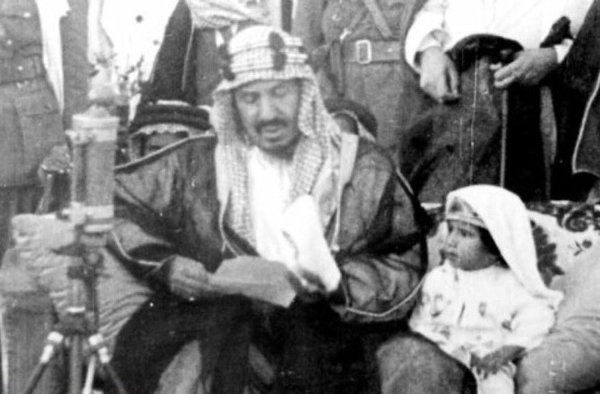
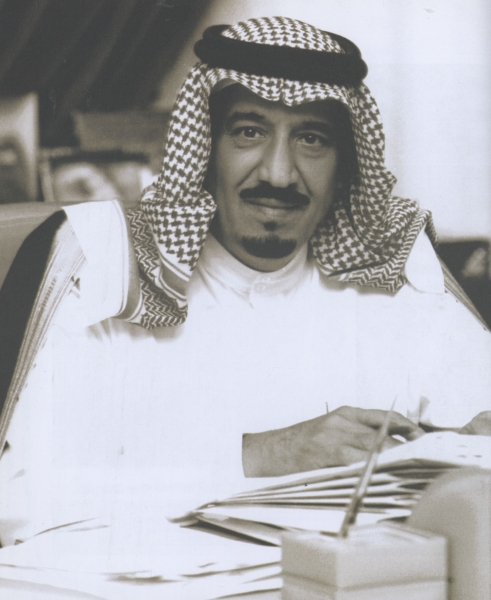
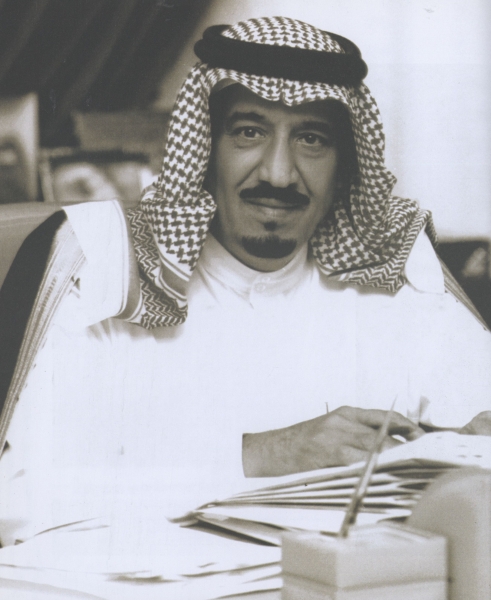
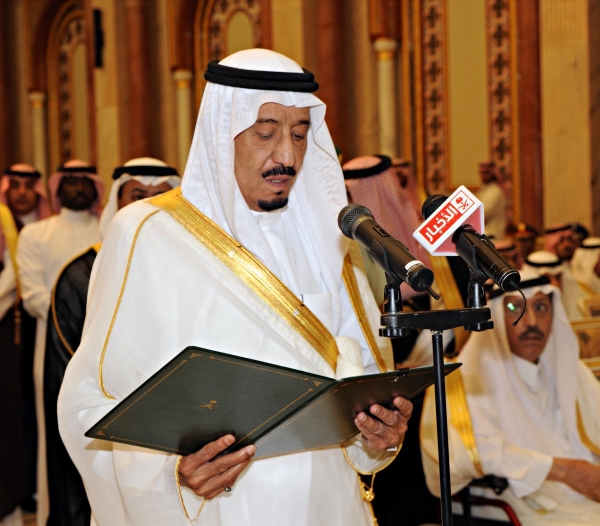
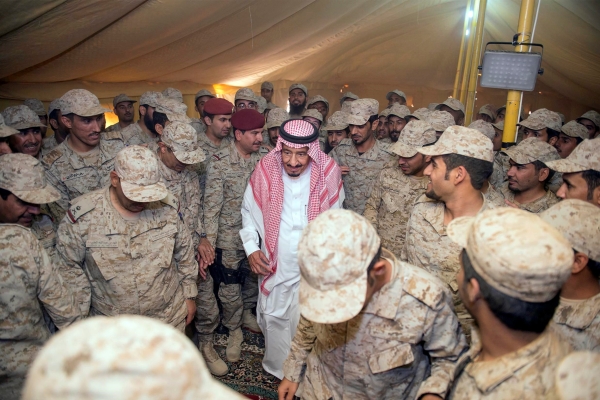
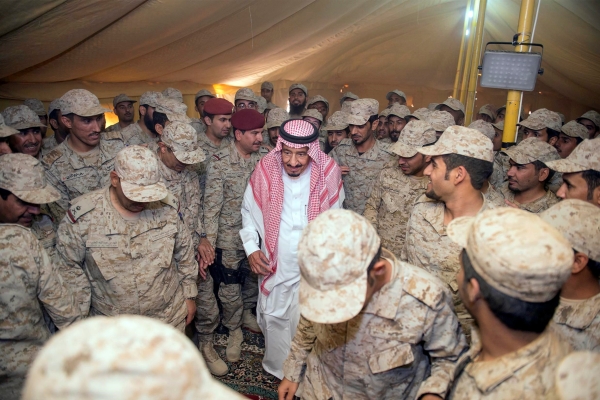
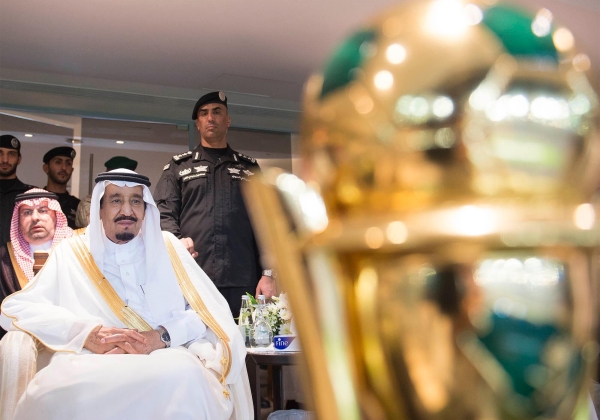
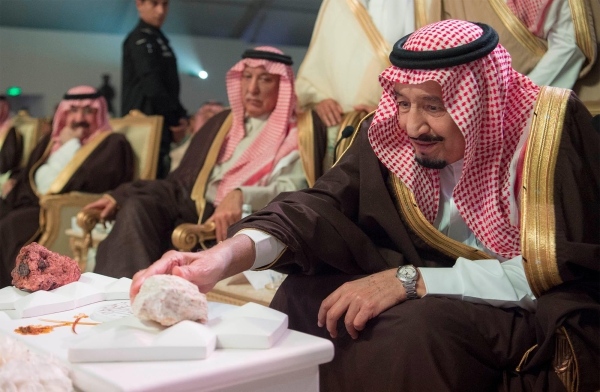
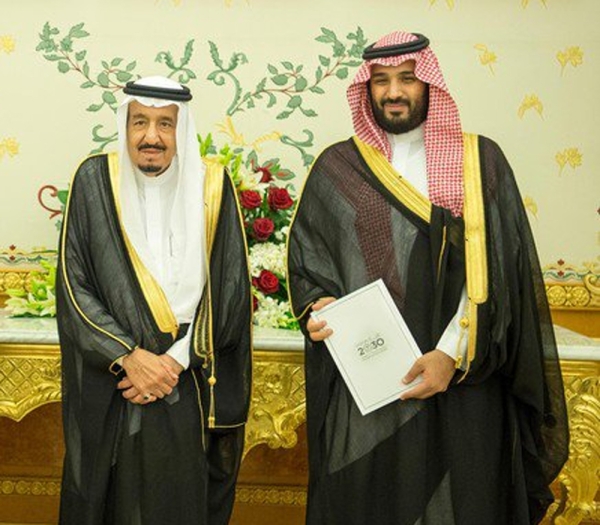
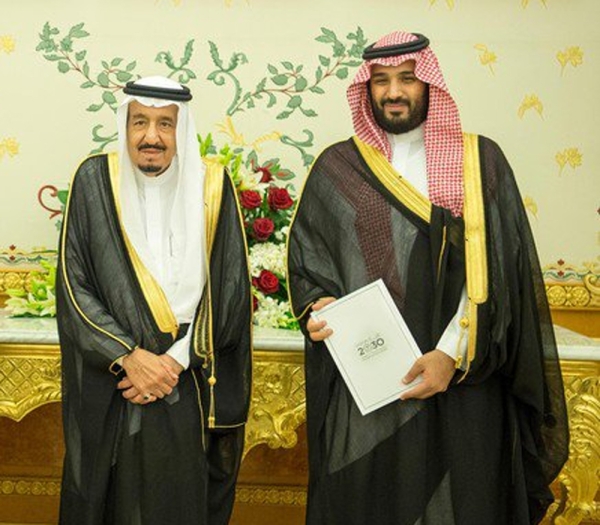

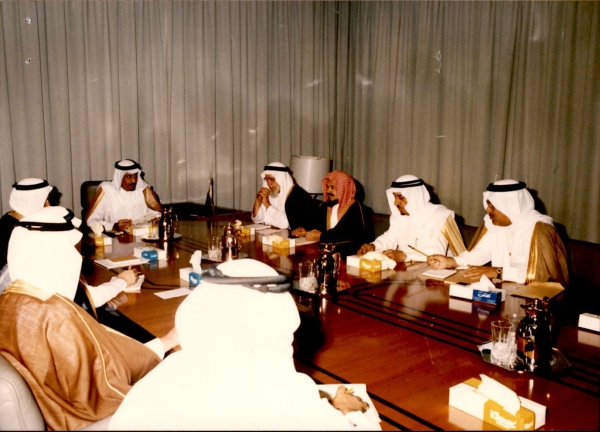
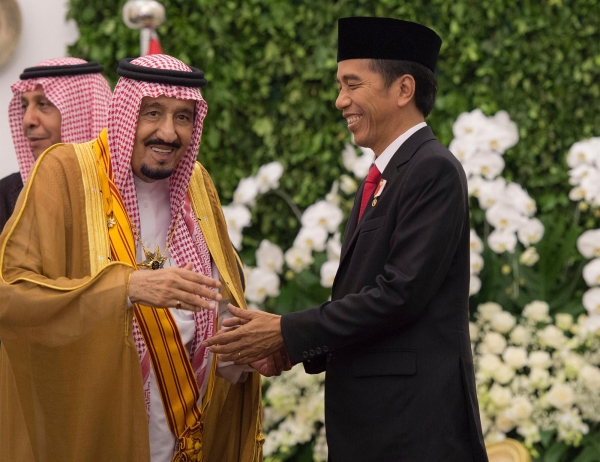
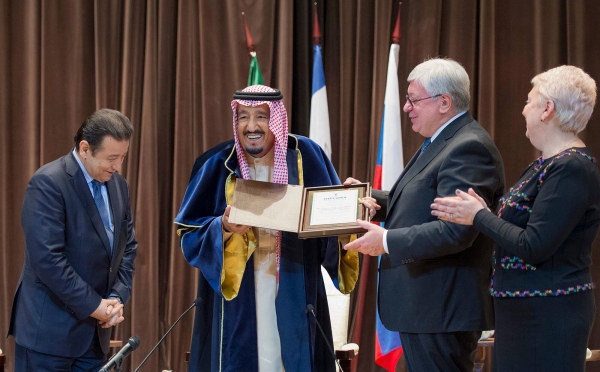
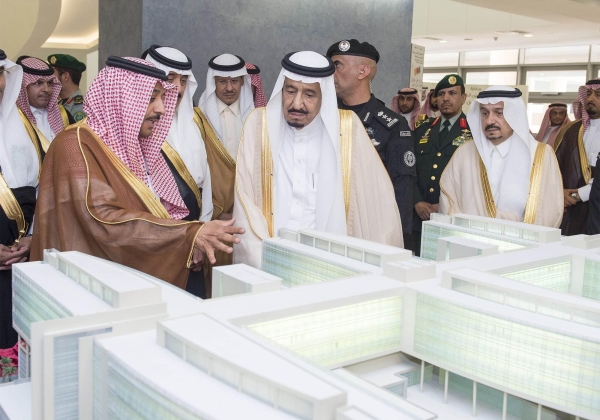
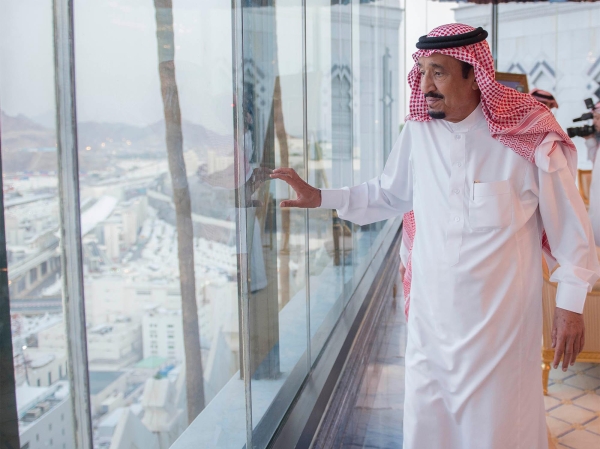
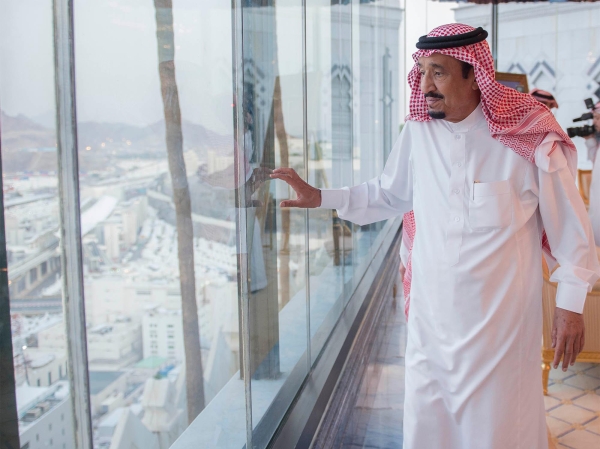
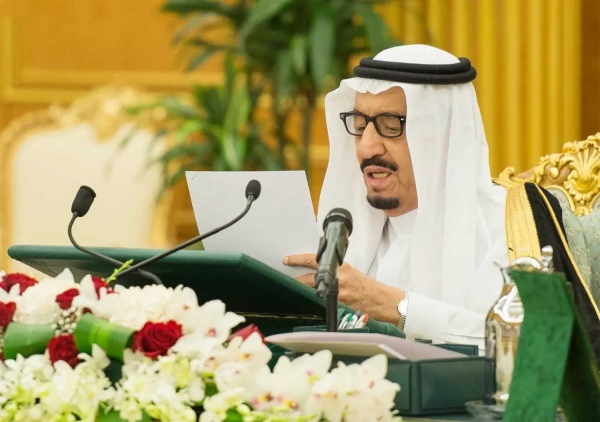
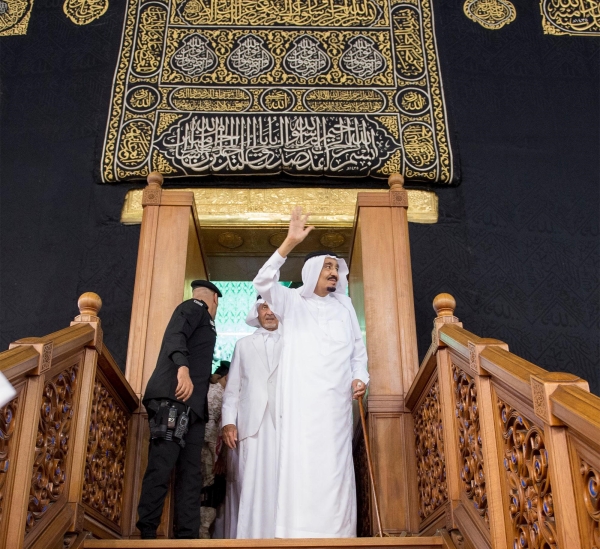
King Salman Bin Abdulaziz Bin Abdulrahman Bin Faisal Bin Turki Bin Abdullah Bin Mohammed Bin Saud is the Custodian of the Two Holy Mosques and King of the Kingdom of Saudi Arabia. He is the seventh king of the country, the sixth ruler, and the latest among the sons of the Founding King Abdulaziz Bin Abdulrahman Al Saud. He assumed the rule on January 23, 2015, becoming the fifteenth ruler of the Saudi state since its founding in 1727.
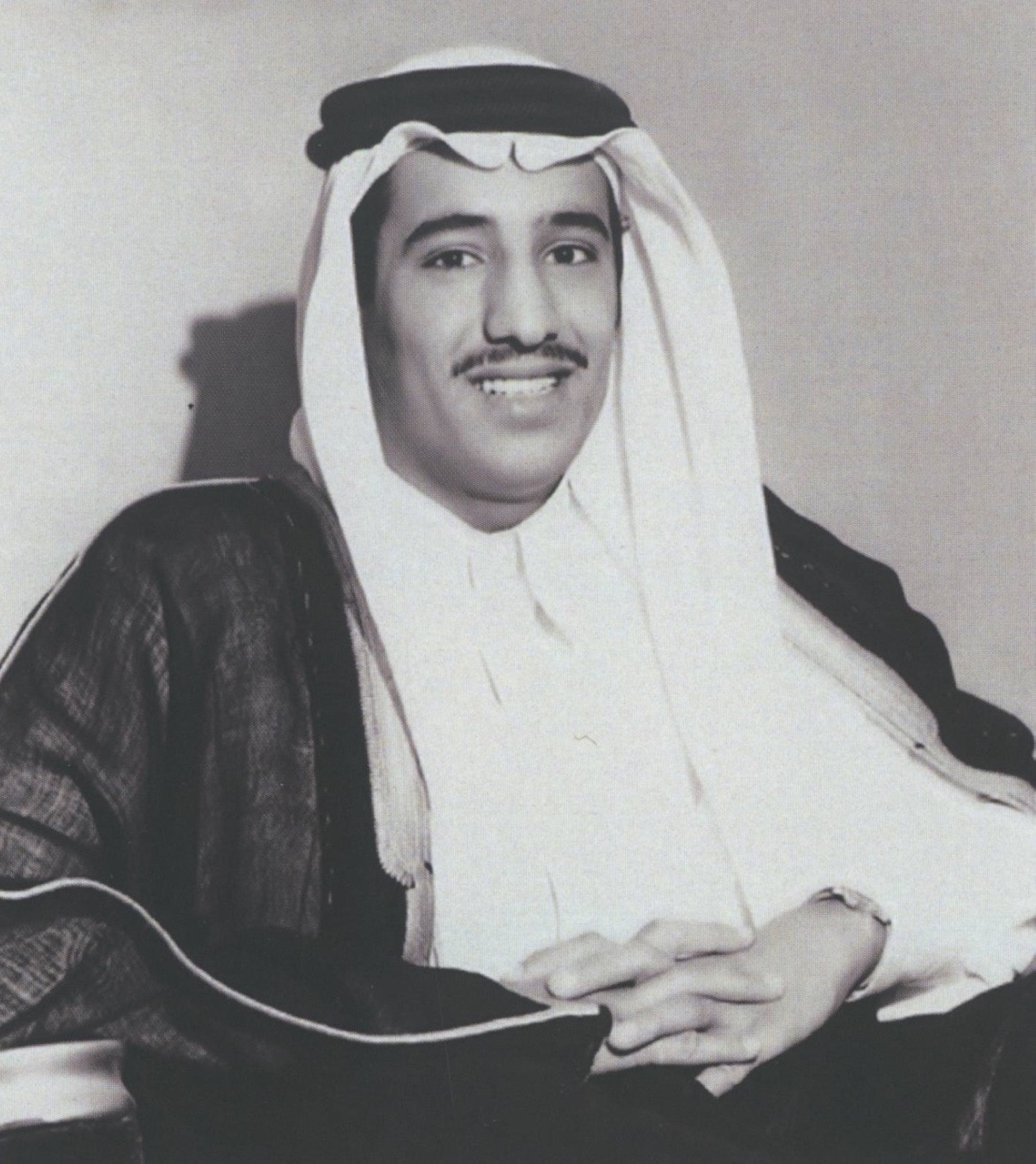
King Salman's life
Lineage of King Salman
He is Salman Bin Abdulaziz Bin Abdulrahman Bin Faisal Bin Turki Bin Abdullah Bin Mohammed Bin Saud Bin Mohammed Bin Muqrin Bin Markhan Bin Ibrahim Bin Musa Bin Rabi'ah Bin Mani' al-Muraydi from Bani Hanifah, from Bakr Bin Wail, from Rabi'ah Bin Nizar Bin Ma'ad Bin Adnan.
He is the twenty-fifth son of the Founding King Abdulaziz Bin Imam Abdulrahman. His ancestors originally settled in the (second) Diriyah City, which was founded by Mani' al-Muraydi, the forefather of Al Saud dynasty. Diriyah later became the capital of the First Saudi State. Their settlement there dates back to 1446 after Mani' al-Muraydi and his family settled in an area encompassing Ghasybah, al-Mulaybeed, and what lies between them in Wadi Hanifah in central Najd in the Arabian Peninsula. He named it Diriyah after his tribe 'al-Duru,' and the first Diriyah where he had lived in the east of the Arabian Peninsula.
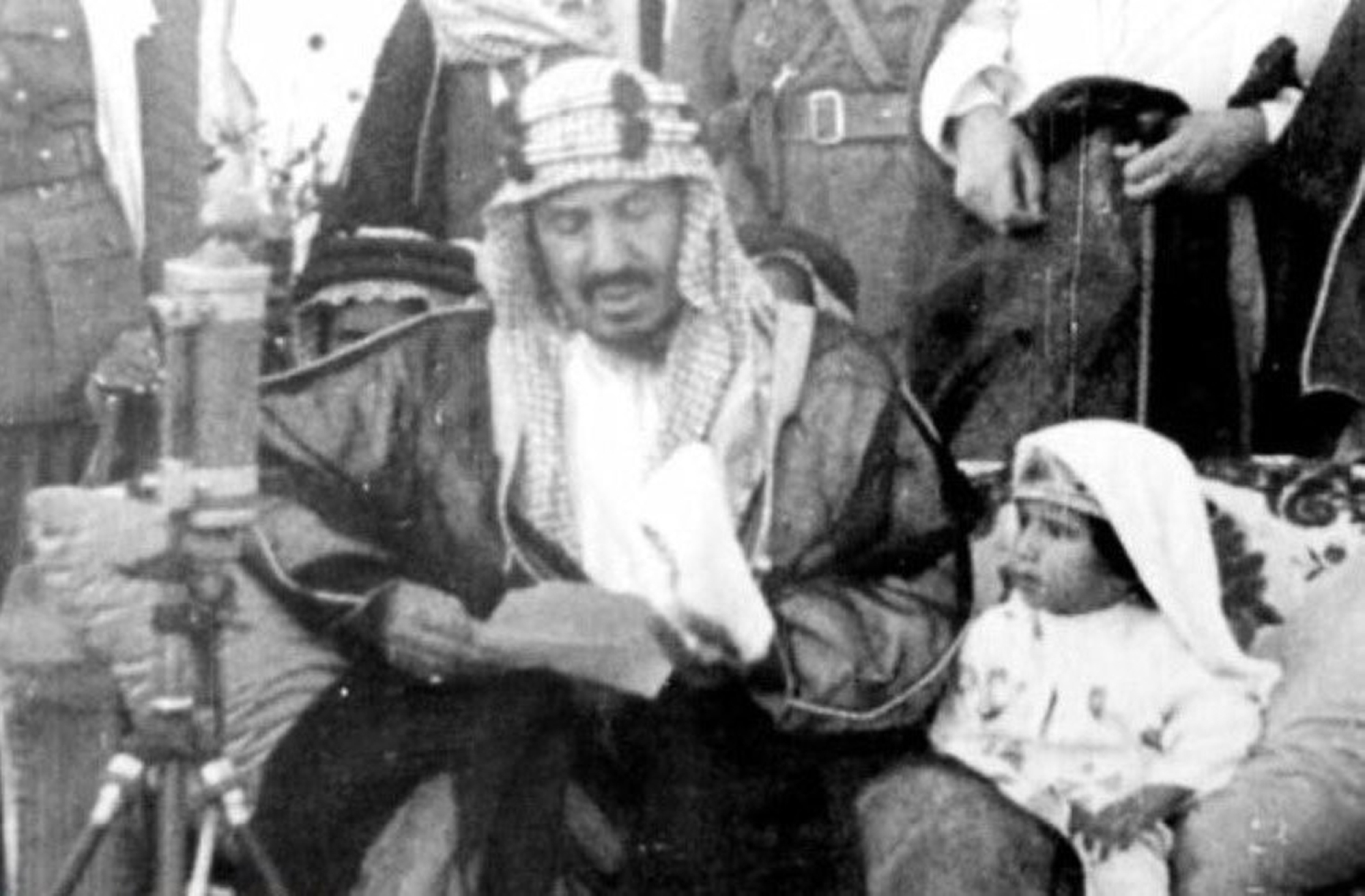
King Salman's birth and upbringing
King Salman was born on December 31, 1935, in Riyadh City, three years after his father, the Founding King, had unified all parts of the Saudi State into one entity and declared its name as the Kingdom of Saudi Arabia. He was raised by his father, the Founding King, and his mother, Princess Hessa Bint Ahmed al-Sudairi.
King Salman's Education
King Salman received his early education with his brothers at the Princes’ School in Riyadh. This was a school established by King Abdulaziz in his palace in 1935 to teach his children. There, he studied religious sciences and modern sciences, and completed the memorization of the Quran on July 22, 1945, at the age of ten.
King Salman accompanied his father, the Founding King, on many missions and occasions. He also frequently attended his father’s councils, which gained him experience and leadership due to the political, economic, and social issues discussed there. Sources mentioned his interest in science, his connections with scholars and intellectuals, and his dedication to constant reading. On March 16, 1954, at the age of nineteen, he was appointed by King Saud as Governor of Riyadh Province, after the death of his father, the Founding King, and his elder brother, King Saud, taking over the rule of the country.
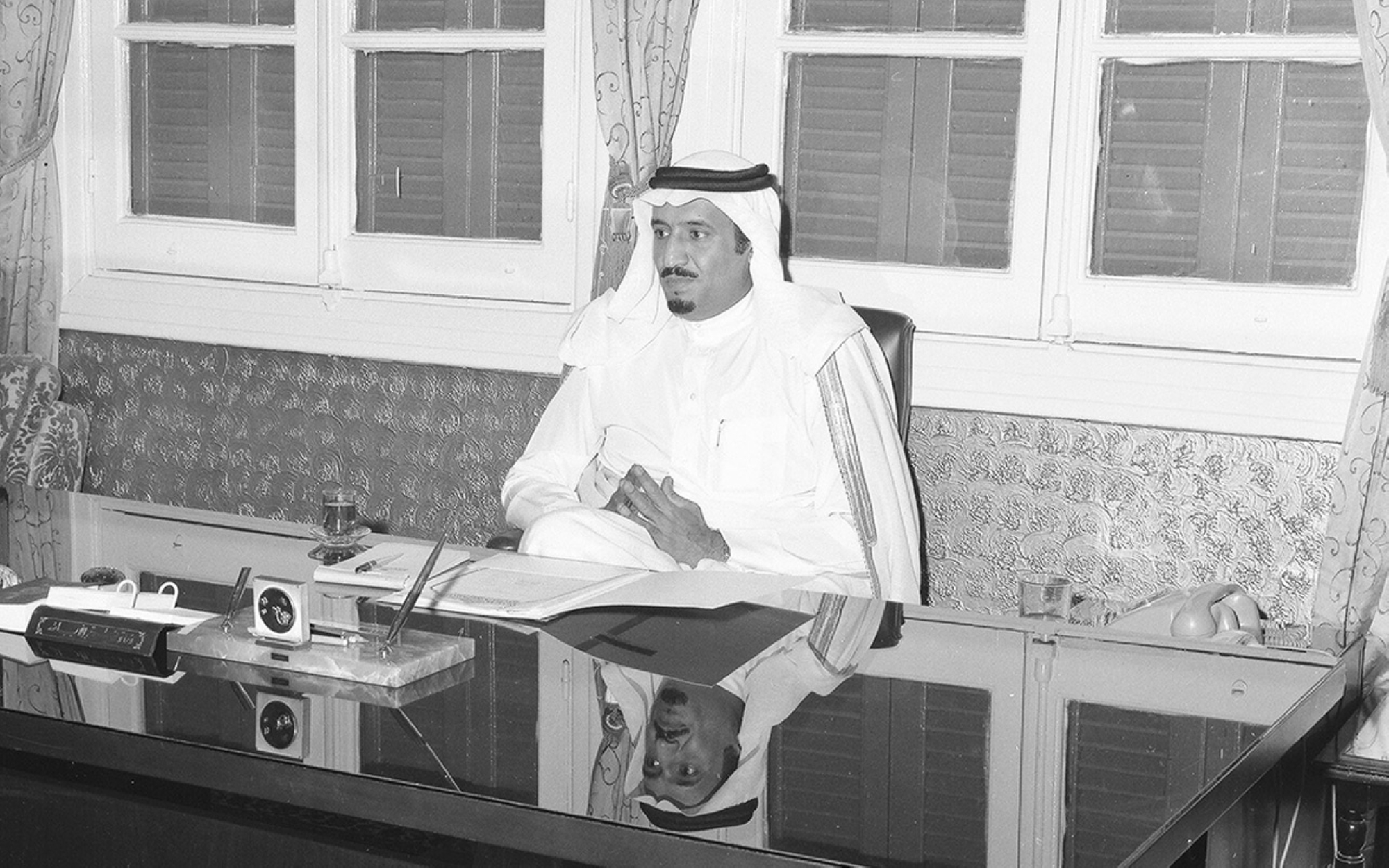
King Salman before assuming the rule
Emirate of Riyadh
After spending a year as Acting Governor of Riyadh Emirate, a Royal Order was issued on April 18, 1955, appointing him Governor of Riyadh Province at the rank of Minister. He continued in that position until December 25, 1960. Later, Royal Order No. 17127 dated February 5, 1963, was issued re-appointing him as Governor of Riyadh Province. This province holds significant importance as it encompasses the capital of the country and serves as the epicenter of administrative, economic, political, and security affairs.
King Salman led the development and advancement march in Riyadh, starting with the infrastructure by modernizing and preparing facilities and services for its residents, relying on modern methods in its management. In a short period, civilized urbanization escalated in Riyadh, and the development plans yielded growth and expansion that covered all areas, making it one of the most developed and prosperous capitals in the world.
On June 18, 1974, the High Commission for the Development of Riyadh (the Royal Commission for Riyadh City) was established with an idea from King Salman. He personally chaired its meetings and followed up on its development plans and achievements throughout his tenure as the Governor of Riyadh Province. The development plan was not limited to the city of Riyadh only but also included other cities, governorates, and centers in the province. Roads, as well as scientific, cultural, civilized, recreational, and medical facilities, were established for them. The commission adopted the principle of comprehensive strategic planning that makes the development process continuous and comprehensive, flexibly accommodating all developments.
During his tenure as the Governor of Riyadh Province, King Salman set up a program to develop al-Hukm Palace area, giving it a special character that distinguishes it and makes it a tourist and cultural attraction. Its inauguration was sponsored by King Fahd Bin Abdulaziz in 1992. He also established one of Riyadh's cultural landmarks, the King Abdulaziz Historical Center. On November 24, 1975, he established the Diplomatic Quarter, Embassies (al-Safarat) Neighborhood. The Ministry of Foreign Affairs and diplomatic missions were moved from Jeddah City to Riyadh, as the capital of the country. In the construction and development plan for urban projects, he was keen to include values and principles that formed the urban identity and civilized face of the city of Riyadh, which was later described as Salmani Architecture. It was placed within a methodological scientific framework called the 'King Salman Charter for Architecture and Urbanism' in December 2021, based on roots, culture, and national identity.
King Salman overcame the challenges of the development march and succeeded in transforming Riyadh from a medium-sized city inhabited by about two hundred thousand people to one of the fastest-growing capitals in the Arab world and one of the largest global cities and prominent regional centers in trade and travel. The area of Riyadh Province, of which he was the governor, is about 380,000 km2, equivalent to 19 percent of the total area of Saudi Arbia. His tenure as the Governor of Riyadh Province coincided with the rule of five kings: King Saud, King Faisal, King Khalid, King Fahd, and King Abdullah.
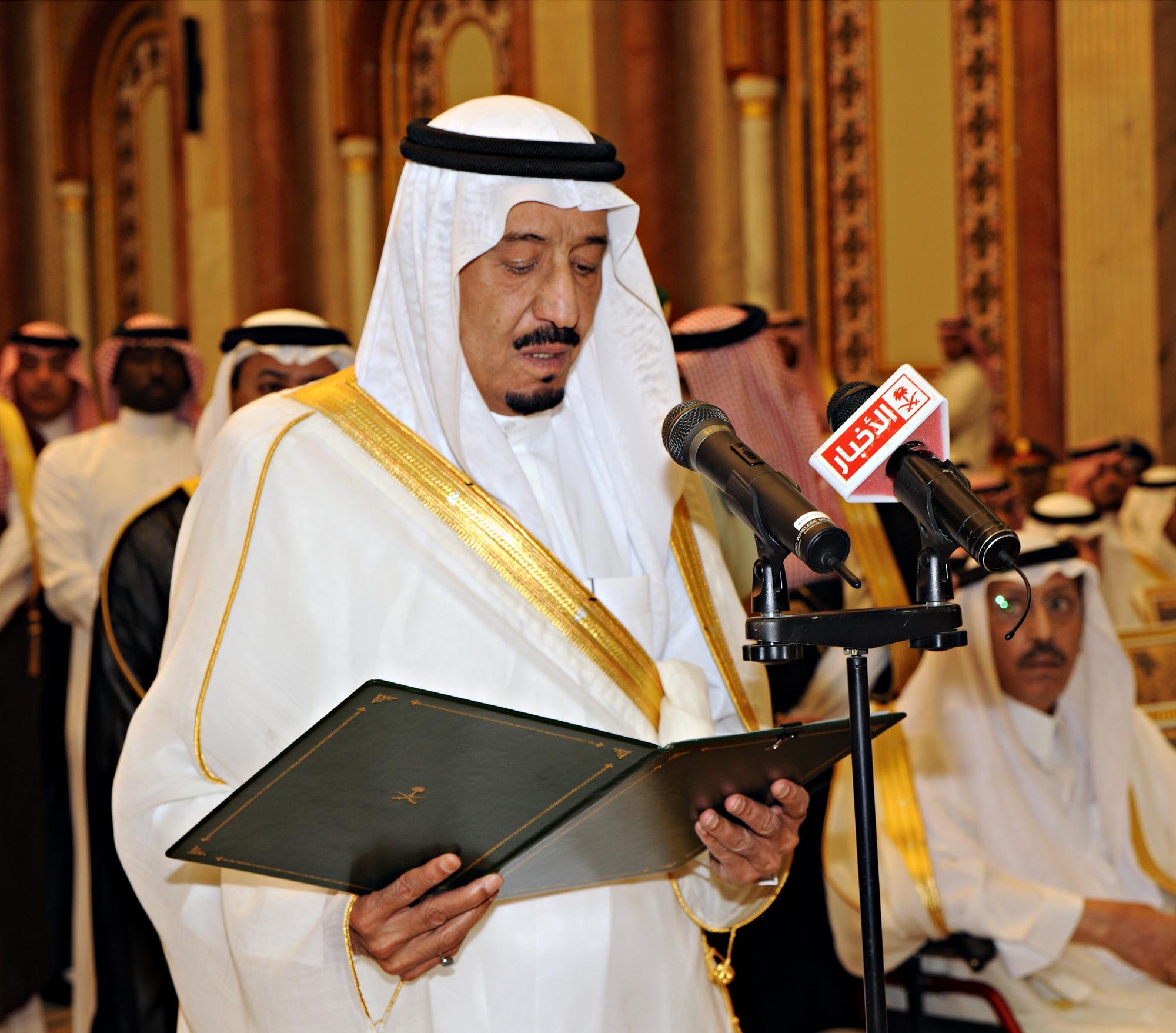
Ministry of Defense
King Salman was appointed Minister of Defense by Royal Order on November 5, 2011, and took over the tasks. He then began looking into its needs in terms of regulation, training, equipment, human resources, and advanced technological systems, to enhance the capabilities and readiness of the armed forces. During that period, he conducted exploratory assessment studies of all the armed forces, visited their locations in various regions of Saudi Arabia, and then started with new and advanced plans for the armed forces to be ready with manpower, equipment, and weapons in all its branches.
Crown prince designation
On June 18, 2012, King Abdullah Bin Abdulaziz appointed King Salman as Crown Prince by Royal Order, while retaining his position as Minister of Defense. He worked with him to govern the internal and external affairs of the state, undertaking all his responsibilities. King Abdullah deputized King Salman to chair the Council of Ministers, attend and inaugurate local and international conferences, and meet delegations and diplomatic missions. On behalf of King Abdullah, he visited many countries around the world and discussed with their leaders the common interests between Saudi Arabia and their countries. In the last two years of King Abdullah’s rule, after his illness intensified, King Salman assumed all the burdens of the state on behalf of his brother King Abdullah until his death on January 23, 2015.
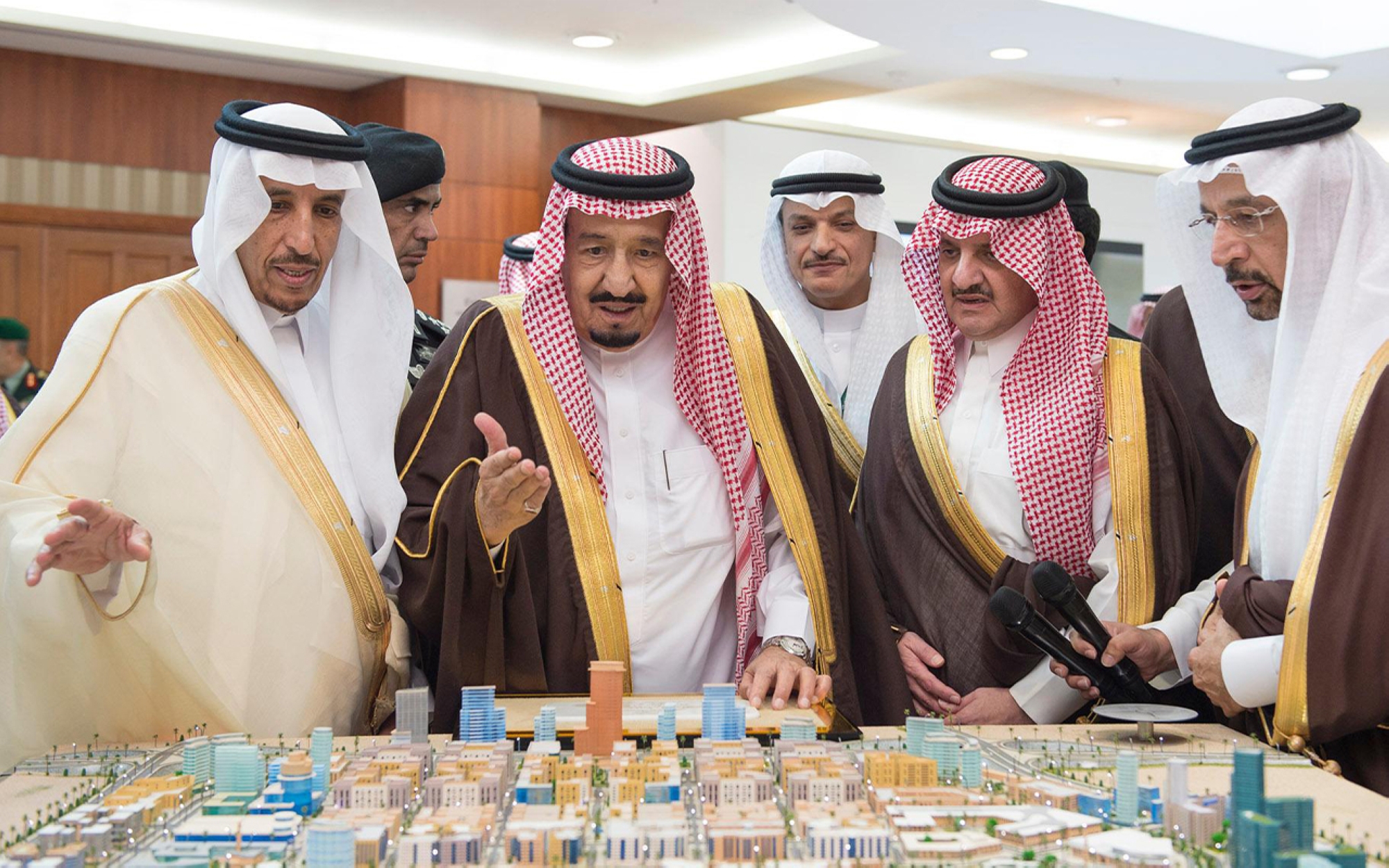
King Salman: The King of Saudi Arabia
Assuming the rule
King Salman was pledged allegiance on January 23, 2015, as the King of Saudi Arabia, in accordance with the Basic Law of Governance, succeeding his brother King Abdullah Bin Abdulaziz. He delivered his first speech to the Saudi people, explaining his approach to governance and vision, and describing the assumption of the rule of the country as a great trust. He emphasized his adherence to the approach followed by Saudi Arabia since its founding by his father, Founding King Abdulaziz, and his sons after him. The constitution is the Holy Quran and the Sunnah of the Prophet Muhammad, peace be upon him (PBUH). He also affirmed unity and solidarity for the Arab and Muslim nations, undertaking everything that would unite ranks, unite the word, and defend the causes of the nation.
Leadership arrangements
In the first forty days of King Salman's rule over Saudi Arabia, he issued forty-four Royal Orders that constituted an integrated reform project in the Saudi administrative structure. They included decisions to reorganize the pillars of state and governance, starting with reconstituting the Council of Ministers and political and economic bodies, with the aim of making a modern shift in the methods and tools of governance management. Through the mindset of a leader, he saw that the rules of governance would be established and stabilized by harmony and integration between two generations in the institution of governance. Therefore, he endeavored to empower the youth generation in leadership and involve them in governance tasks, believing in their capabilities. This is considered a vision for the future of the state and a strategic vision expressing King Salman’s orientations towards the future interests and gains of the nation and people.
Three months after assuming rule, the Custodian of the Two Holy Mosques appointed Prince Mohammed Bin Salman Bin Abdulaziz Al Saud as Crown Prince and Second Deputy Prime Minister. Two years later, on June 21, 2017, he was appointed as the Crown Prince and Deputy Prime Minister, following the approval of the members of the Allegiance Council. An article of the Basic Law of Governance was amended to stipulate that the rulers of the country shall be from amongst the sons of the founder and their descendants, and the most upright among them shall receive allegiance to rule.
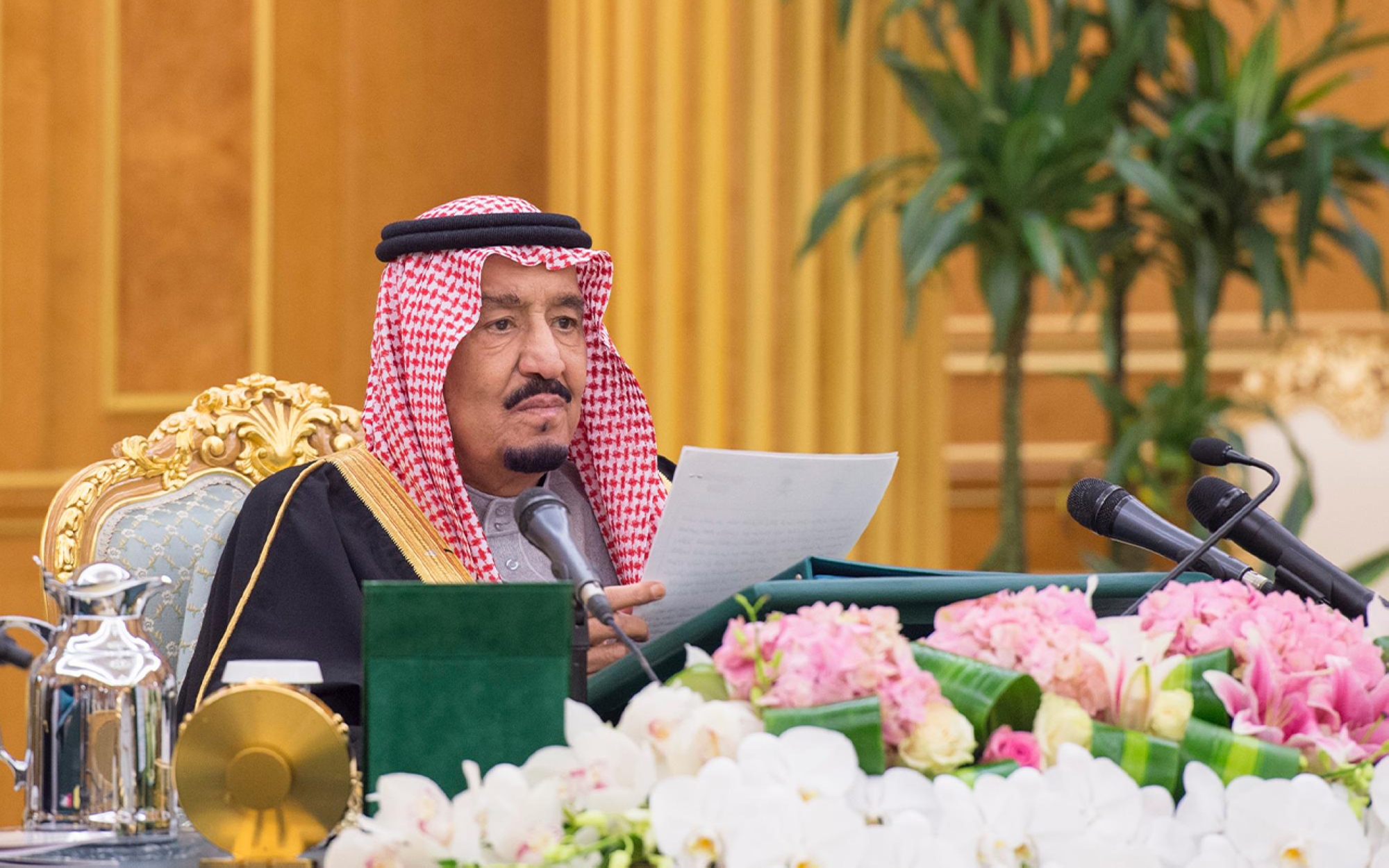
Ministerial amendments
In continuation of the state’s development and construction march, King Salman looked at the importance of unifying orientations in government agencies to make a qualitative shift at all levels. To ensure the organization of everything related to political, security, economic, and development affairs, a number of bodies were abolished, they are: the Supreme Committee for Educational Policy, the Supreme Committee for Administrative Organization, the Civil Service Council, the higher commission for King Abdulaziz City for Science and Technology, the Council of Higher Education and Universities, the Supreme Council for Education, the Supreme Council for Petroleum and Mineral Affairs, the Supreme Economic Council, the National Security Council, the Supreme Council for King Abdullah City for Atomic and Renewable Energy, the Supreme Council for Islamic Affairs, and the Supreme Council for the Affairs of Persons with Disabilities. Two councils were established, organizationally linked to the Council of Ministers, they are: the Council of Political and Security Affairs and the Council of Economic and Development Affairs, to raise the efficiency of performance and the level of coordination between government entities, avoiding duplication. This would lead to the integration of roles, responsibilities, and powers, keeping pace with the rapid developments and changes in various fields.
On May 7, 2016, he ordered the merger of the Ministry of Labor and the Ministry of Social Affairs into a single ministry named the Ministry of Labor and Social Development. Then, on February 25, 2020, the Ministry of Civil Service was merged with the 'Ministry of Labor and Social Development.' It was ordered to rename it as the 'Ministry of Human Resources and Social Development'. Additionally, the 'Saudi General Investment Authority' was transformed into the 'Ministry of Investment.' The 'General Sports Authority' was converted into the 'Ministry of Sport,' and the 'Saudi Commission for Tourism and National Heritage' into the 'Ministry of Tourism.'
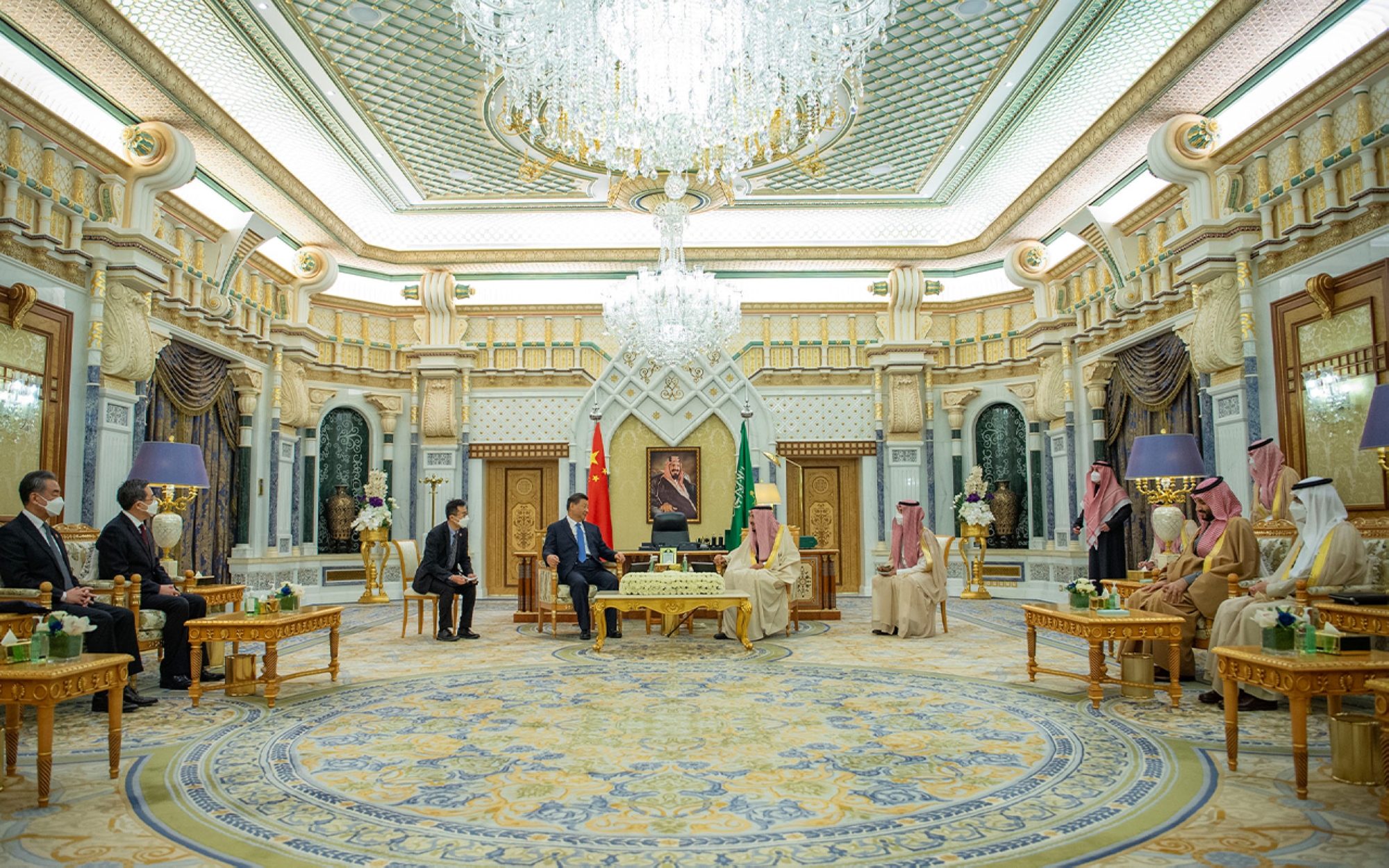
Foreign policy
In the first one hundred days of King Salman’s reign, the capital Riyadh witnessed political and diplomatic activity, represented by receiving a number of world leaders and holding bilateral meetings that affirmed the solidity of Saudi policy to serve regional and global peace and stability. King Salman also supported Arab and Islamic causes, most notably the Palestinian cause, reaffirming Saudi Arabia's firm and supportive stance on the Palestinian position and their rights in their occupied territories.
In his foreign policy, King Salman sought to strengthen international security and peace, and consolidate Saudi Arabia's position as an active player in resolving political crises and humanitarian challenges that threaten the security of countries and the stability of peoples in the Arab Gulf and the Middle East. His policies helped pass legislation that adopted peacefulness in conflict resolution and supported growth and prosperity.
King Salman Bin Abdulaziz's leading role was evident through the issuance of the Makkah Declaration at the fourteenth Session of the Islamic Summit Conference on May 31, 2019, to combat extremism and terrorism, promote interfaith dialogue, resolve political disputes between countries and entities, provide material and moral support to developing countries, and protect the name of religion from terrorism and extremism.
Updates during King Salman's reign
State affairs arrangements
In a move to develop the state's justice agencies on scientific and civilized grounds, a Royal Order was issued on June 17, 2017, to amend the name of the 'Investigation and Public Prosecution Authority' to the 'Public Prosecution,' and its president to be called the 'Public Prosecutor.' The Public Prosecution is directly affiliated with the King, and has complete independence, free from external intervention. This aligns with international legal rules and principles and complies with Sharia rules and regulations. This is crucial to maintain the distinction between the executive and judicial authorities in the state, granting it complete independence in carrying out its duties, ensuring its total impartiality, and operating without influence from any party, in accordance with the principle of separation of powers.
King Salman took a resolute stand against corruption, aiming to eradicate it and safeguard integrity. On November 4, 2017, he directed the formation of a supreme committee, chaired by His Royal Highness Prince Mohammed Bin Salman, crown prince and prime minister, with the membership of: the chairman of the Control and Investigation Board, chairman of the National Anti-Corruption Commission, president of the General Bureau for Auditing, the public prosecutor, and director of State Security. Its mission is to identify violations, crimes, persons, and entities related to cases of public corruption, investigate them, take all penal and precautionary measures, return funds to the state treasury, and register properties and assets in the name of state real estate.
Economic and financial sector
Since King Salman assumed the rule, Saudi Arabia has witnessed comprehensive economic and financial reforms. He set the axis of a thriving economy among the axes of Saudi Vision 2030. Reforms were launched from this axis to develop and diversify the economy, reducing dependence on oil, and transforming it into a diverse and sustainable economy, focusing on enhancing productivity, increasing the contribution of the private sector, and enabling the third sector. Saudi Arabia implemented a number of initiatives and structural reforms to support and enable the economic transformation. This transformation included a number of key efforts, encompassing strengthening local content and national industry, launching and developing promising economic sectors, in addition to maximizing the role of the private sector and small and medium enterprises, and enhancing overall fiscal sustainability. These reforms helped strengthen the Saudi economy's ability to overcome the COVID-19 pandemic in 2020.
The economic reforms contributed to raising economic growth rates. In 2022, Saudi Arabia achieved the highest growth rates among the G20 countries. Growth in gross domestic product (GDP) reached 8.7 percent, despite the complex economic circumstances and challenges experienced by world countries, exceeding the expectations of international organizations that reached at most 8.3 percent in their estimates. It is also the highest annual rate in the past decade, according to what was issued by the General Authority for Statistics on March 9, 2023, according to the report on GDP and indicators of national accounts for the fourth quarter of 2022. The report states that all economic activities achieved positive growth rates during the year. The contribution rate of crude oil and natural gas activities reached 32.7 percent, then government services activities by 14.2 percent, followed by manufacturing industries activities, excluding oil refining, by 8.6 percent, then wholesale and retail trade, restaurants and hotels activities by 8.2 percent.
Security sector
During King Salman's reign, the security sector witnessed regulations and structural reforms in several sectors, along with the establishment of programs and centers to enhance the capabilities of the Saudi security system. On April 22, 2017, King Salman issued a directive to establish a center named the 'National Security Center,' which is structurally affiliated with the Royal Court. Additionally, a position titled 'National Security Advisor' was created within the Royal Court for this center. In the organizational restructuring of the Ministry of Interior, King Salman issued an order on July 20, 2017, which mandated dividing the security affairs sector related to state security into an independent entity named the 'Presidency of State Security.' This entity is tasked with handling all matters related to state security and is directly linked to the Prime Minister. Furthermore, he ordered the separation of entities, including the 'General Directorate of Investigations,' 'Special Security Forces,' 'Special Emergency Forces,' 'Security Aviation,' 'General Administration of Technical Affairs,' and the 'National Information Center,' from the Ministry of Interior, along with all tasks related to the presidency, including combatting terrorism, its financing, financial investigations, and incorporating them into the 'Presidency of State Security.' This move aims to centralize the responsibilities of state security within sectors dealing with security and field operations, while the Ministry of Interior focuses on providing civil services, maintaining order, and safeguarding civil rights through general security agencies.
The security system within the Ministry of Interior has witnessed a number of developmental projects, including the Security and Safety Cities Project, the National Center for Security Operations (911), the Optical Fiber Network, the Unified Security Communication Network Program (TETRA), Integrated Security Systems (SIE), the Maritime Assets Project for the Border Guard and its maintenance programs, the Armored Vehicles and Special Civilian Vehicles Project, the management of Security Support Projects, and the management of Multi-Mission Airborne Platforms and Systems Projects. Additionally, there is the completion of the project for the Custodian of the Two Holy Mosques to develop security headquarters, the Security Training Centers Project 'Officers Clubs,' the Special Diplomatic Security Force Building Project, and the General Administration Building for International Cooperation in the Diplomatic Quarter.
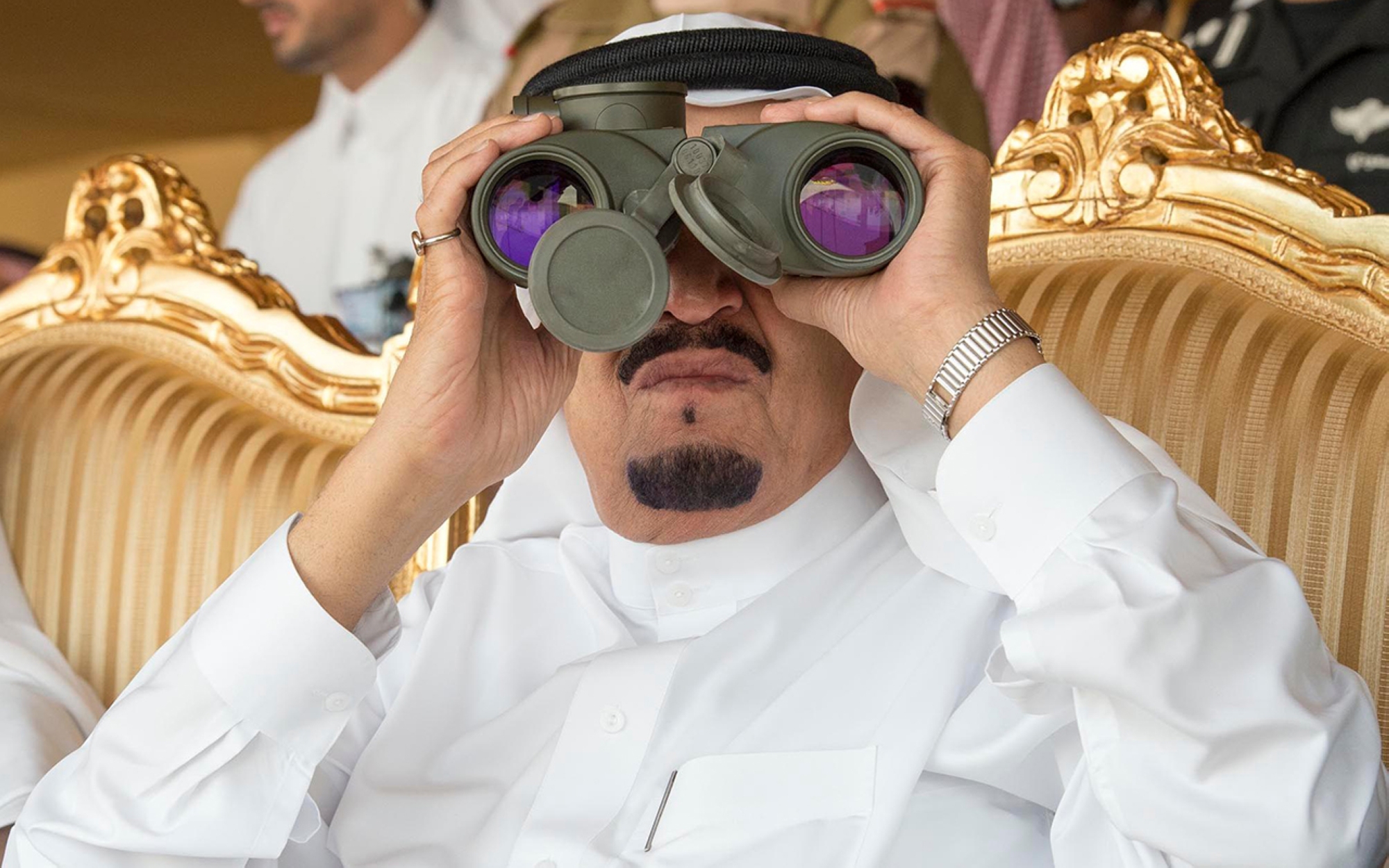
The military sector
The development system during the reign of King Salman encompassed the enhancement of all branches of the armed forces, commencing with the project for localizing military industries, a key component of Saudi Vision 2030. Saudi Arabia aims to localize over 50 percent of total government spending on military equipment and services by 2030. In pursuit of this objective, the General Authority for Military Industries (GAMI) was established in August 2017. This authority is responsible for localizing, regulating, and empowering the military industry sector in Saudi Arabia, transforming it into a sustainable and domestic sector. The goal is to reinforce Saudi Arabia's independence and military readiness, and enhance its national security.
To combat extremist ideologies and terrorism, the Center for Safeguarding Intellect was established on April 30, 2017. Its Board of Trustees is chaired by Prince Khalid Bin Salman, the minister of defense. The center aims to expose false intellectual ideologies propagated by terrorism and extremism, clarify the correct Sharia approach to issues related to extremism, and present intellectual initiatives to various entities within and outside Saudi Arabia. Additionally, it works on intellectual immunization against extremism through preventive and corrective programs, dismantling the means through which terrorism attracts its followers, and advocating a moderate and balanced approach to Islam.
In the field of training and bolstering the defense capabilities of Saudi Arabia, the Air Warfare Center was established at King Abdulaziz Air Base in Dhahran, east of Saudi Arabia. This military air center, affiliated with the Royal Saudi Air Force, possesses advanced capabilities in training aircrews and their support staff in a setting similar to modern warfare. It also provides testing and evaluation of systems and weapons to assess their effectiveness and impact, ensuring their readiness for implementation. The cornerstone for the center was laid by Crown Prince and Prime Minister, Prince Mohammed Bin Salman, on March 31, 2019, when he served as the Minister of Defense.
In the field of research, development, and innovation related to defense technologies and systems, a decision was issued to establish the General Authority for Defense Development on September 14, 2021. This authority is responsible for defining the objectives and priorities of research, development, and innovation activities in the field of defense technologies and systems, including their outcomes. It specializes in formulating policies and strategies for defense systems and organizing their structures, programs, and implementation plans. Furthermore, it manages, directs, and monitors the operations of these activities.
Industrial sector
As part of Saudi Vision 2030, which aims to build a strong and sustainable economy, a Royal Order was issued on December 27, 2018, to regulate an authority named the 'Local Content and Government Procurement Authority.' This authority is organizationally linked to the Chairman of the Council of Economic and Development Affairs. Its objective is to develop local content in all its components at the national economic level and to support and monitor government procurement activities. In 2019, the National Industrial Development and Logistics Program (NIDLP) was launched as part of Saudi Vision 2030 programs. The program aims to transform Saudi Arabia into a leading industrial force and a global logistics platform. The program launched the initiative 'Made in Saudi' on March 28, 2021. The initiative aims to market national goods and services, making them the preferred choice both locally and globally, through partnerships with both the public and private sectors.
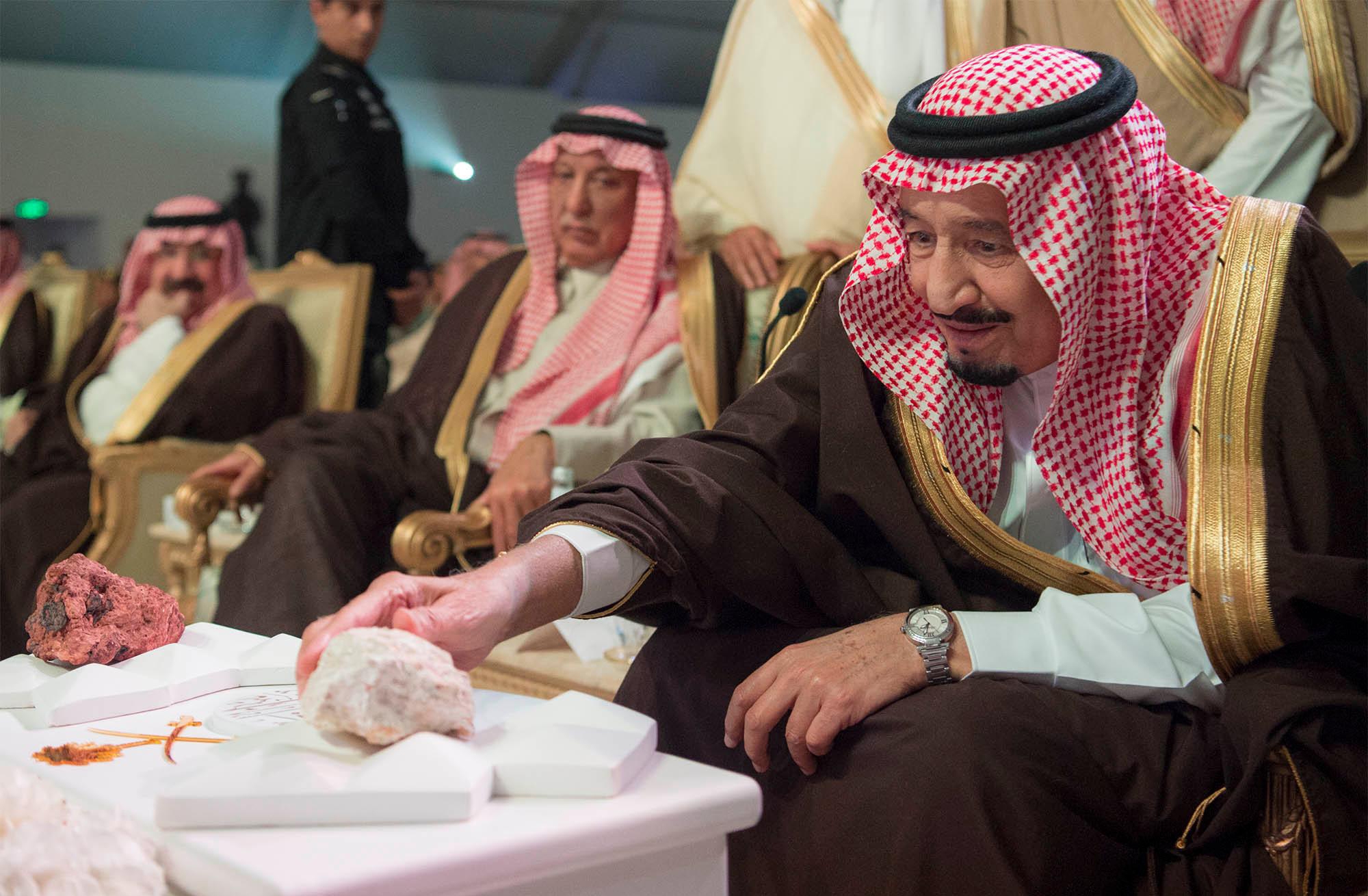
The Ministry of Industry and Mineral Resources launched the 'Taadin' (mining) Platform in January 2019. The platform focuses on providing licensing services for investors, enhancing governance principles in mining investments, establishing effective mechanisms for dispute resolution, and ensuring the efficiency of operations related to mining activities. By 2020, around 150 licenses were issued, involving approximately 550 investors. Through this initiative, the license renewal time was reduced to one day after linking the process with banks. Simultaneously with the launch of the platform, the National Geological Database was inaugurated, comprising approximately 5,500 mineral sites and geological survey and exploration information spanning about eighty years. Additionally, it includes ten thousand technical reports.
In February 2020, and in line with the pillars of Saudi Vision 2030, which aims to increase the percentage of non-oil exports, the Saudi EXIM Bank was established. The purpose is to enhance the development and diversification of Saudi exports, increasing their competitiveness in global markets across various sectors by providing a range of financial services for international investors. In April 2020, the 'Senaei' Platform was launched to streamline industrial investment, enabling investors to provide all their services electronically through a single platform. The platform aims to showcase Arab industrial products, address the repercussions of the COVID-19 pandemic, and offer a service for applying for industrial licenses. This service allows the cancellation of preliminary approvals issued by the Industrial Services Agency and streamlines procedures for investors.
To maximize the benefit of modern technologies and harness them to achieve the goals of Saudi Vision 2030, Saudi Arabia has worked on implementing applications of the Fourth Industrial Revolution. Plans for the transformation of eight factories have been delivered, and their initial models have been implemented in five factories. The Innovation Center for the Fourth Industrial Revolution, affiliated with King Abdulaziz City for Science and Technology (KACST), encompasses various fourth-generation industrial technologies. These include digitally controlled manufacturing tools, digital reverse engineering gear, augmented reality setups, and advanced metal casting and manufacturing equipment. Saudi Arabia also focused on developing the infrastructure for cities and industrial oases, including fourteen industrial cities and oases, covering a total area estimated at thirty-four million m. After restructuring the industrial sector in Saudi Arabia, supporting investment in it, and providing necessary facilities for investors, the investment volume in the industrial sector increased from SAR955.4 billion before the Vision to SAR1.11 trillion by 2020.
The commerce sector
Saudi Vision 2030 aimed to maximize investments to support economic returns, and it launched a platform named 'Invest Saudi' that represents a unified national identity working to market investment in Saudi Arabia. The platform includes a database for investment opportunities and investors. Additionally, ten new entities were established to enhance the commerce and investment environment in Saudi Arabia, including the Small and Medium Enterprises General Authority, the Saudi Authority for Intellectual Property, the General Authority of Foreign Trade, the Saudi Conventions and Exhibitions General Authority, the E-Commerce Council, the National Anti-Commercial Concealment Program, the National Competitiveness Center, the Saudi Business Center, the Saudi Accreditation Center, and the Bankruptcy Commission.
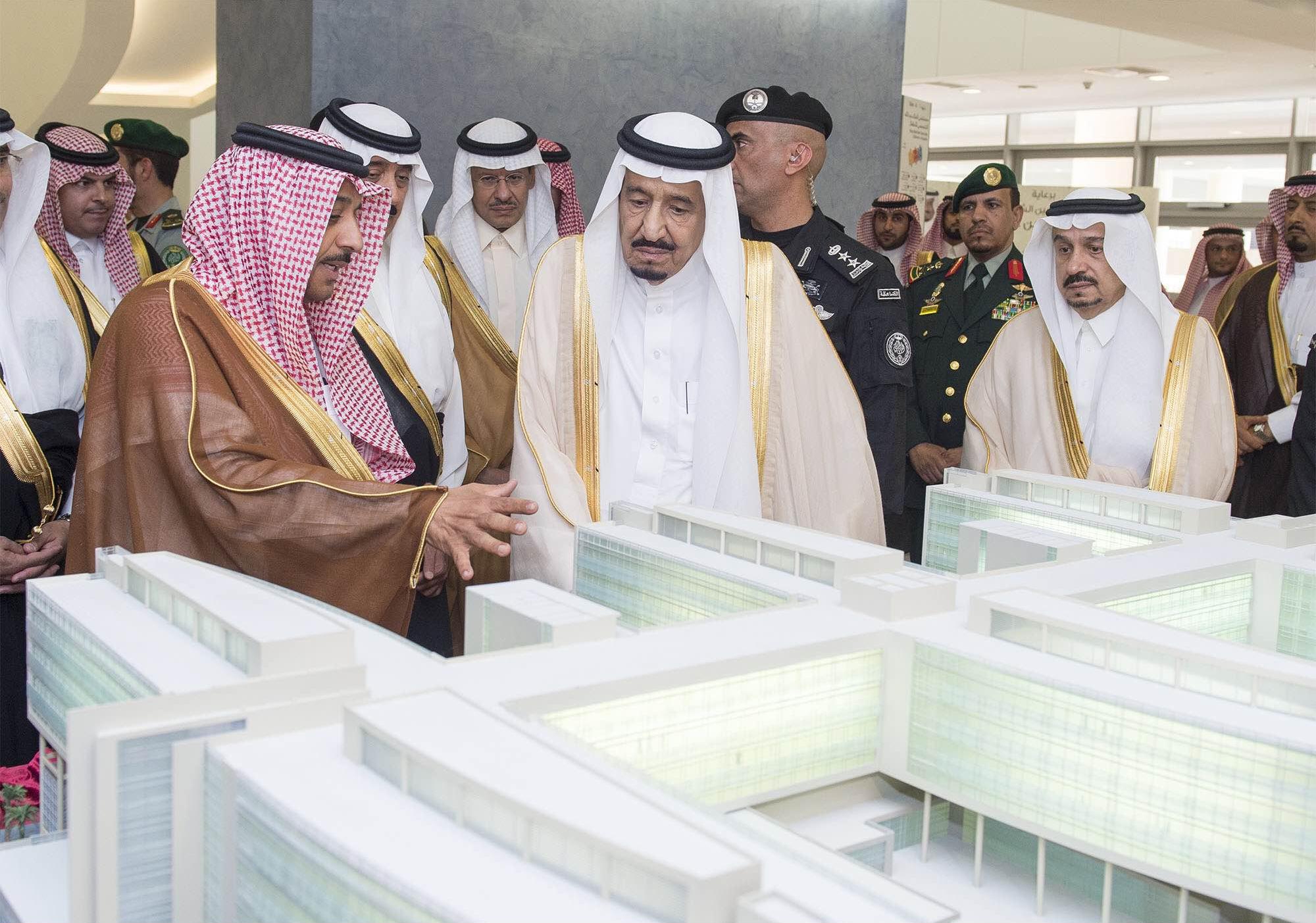
The health sector
During King Salman's reign, the healthcare sector received significant attention. One of the pillars of Saudi Vision 2030 is to provide high-quality healthcare services to ensure the well-being of all Saudi Arabia's citizens. Concerted efforts were directed towards delivering proper healthcare to the population. As a result, the health sector made many achievements aimed at improving system efficiency, enhancing health facility capacities, and developing various electronic services in the sector. This included improving the standard of living through enhanced quality of services, easier access to them, and prevention of health risks. By the end of 2021, fourteen health clusters were launched, serving twenty-nine million beneficiaries.
In 2021, ten new hospitals were established across the provinces of Saudi Arabia, with a combined capacity of over 1,500 beds. To streamline healthcare procedures for the residents of Saudi Arabia, digital applications and platforms were introduced to activate virtual healthcare services. Saudi Arabia ranked thirteenth among 184 countries in the Global COVID-19 Index prepared by the World Health Organization, which assesses the health impact of the pandemic and recovery indicators. Saudi Arabia also secured the top position among Arab countries, twelfth in the G20, and fourteenth globally in the field of COVID-19 research.
In 2017, the Saudi Patient Safety Center was established to improve and enhance the safety of healthcare and ensure the provision of safe services. It highlights the contributions of Saudi Arabia in supporting global efforts in the health sector. In 2020, the Saudi Patient Safety Center was selected to be a collaborating center with the World Health Organization regarding patient safety policies and strategies.
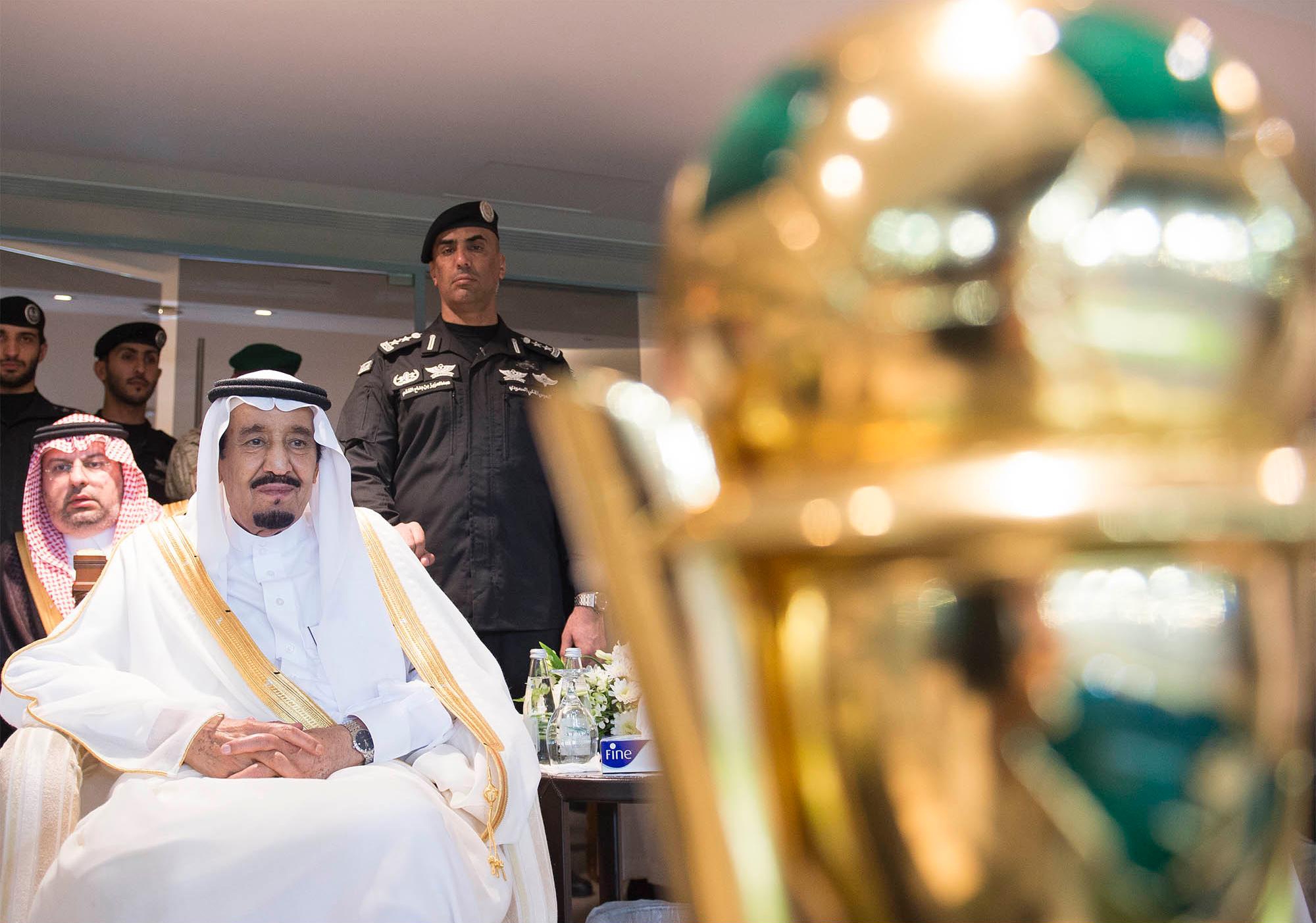
The sport sector
During the reign of King Salman, Saudi Arabia has emerged as a global hub for sporting events, showcasing its capability, expertise, and strength as a leading sport tourism destination, capable of hosting key sport events. Since 2018, Saudi Arabia has hosted over one hundred international sport events. Notably, it won the bid to host the 2034 FIFA World Cup, becoming the first nation in history to secure the organization of this global event with forty-eight participating teams from across the world's continents. Saudi Arabia’s bid earned the highest rating in World Cup history, receiving a score of 419.8 out of five hundred. In addition, Saudi Arabia successfully won the rights to host the twenty-second Asian Games in 2034 and the inaugural Olympic Esports Games. It will also host the 2027 AFC Asian Cup and the 2025 FIBA Asia Cup. Other global events held in Saudi Arabia include the Saudi Dakar Rally, the Spanish Super Cup, the Italian Super Cup, the Asian Handball Championship (World Championship qualifiers), the Diriyah ePrix, the Formula One stc Saudi Arabian Grand Prix, the World Handball Championship “Super Globe,” the Next Gen ATP Championship, the Fanatec GT World Challenge, the Longines Global Champions Tour, the WTA Finals, the Battle of the Giants, the Snooker Masters, the World Billiards Championship, the Saudi Smash, the FEI World Cup Finals (show jumping and dressage), the Extreme E, and the FIFA Club World Cup.
At the level of sport internally, King Salman ordered the support of the sports sector immediately upon assuming the rule. In January 2015, he issued an order to support sport clubs with a sum of SAR10 million for each club in the Professional League and SAR5 million for each club in the First Division, along with SAR2 million for other officially registered clubs. Additionally, a strategy to support sport clubs was launched in 2019, achieving various accomplishments, including raising the average governance score of clubs to 54 percent, a 755 percent increase in various sport activities in interactive clubs, and the creation of approximately 3,097 job opportunities in clubs over 2020-2021, representing a 129 percent increase. Additionally, a service for licensing sport halls and centers was launched in 2017, with the number of licensed centers reaching 1,259 in 2019, and increasing to 1,549 centers in 2020. In line with the goals of Saudi Vision 2030 to promote diverse sports in Saudi Arabia, the count of sports federations increased from thirty-two in 2016 to sixty-four in 2020. Additionally, three private sports investment companies linked to clubs were established in 2020, aiming to ensure financial sustainability for clubs.
In February 2020, a Royal Order was issued to convert the General Sport Authority into a ministry named the 'Ministry of Sport,' alongside the launch of a strategy to support Saudi sports federations. There was also the 'Elite Athlete Development' program aimed at preparing national sports competencies in the long term and the 'Fakhr' (Pride) program to qualify talented individuals with disabilities.
The Nafis platform was launched to support the establishment of sport clubs and academies, and the licensing of two thousand academies and five hundred clubs. Additionally, clubs were permitted to operate under the Companies Law. Also, the Saudi League has emerged as one of the world's top leagues, broadcasting in over 160 countries, generating investment returns, and establishing a global sport presence.
The education sector
On January 29, 2015, a Royal Order was issued to merge the Ministry of Higher Education and the Ministry of Education into a single ministry named the 'Ministry of Education.' Education achieved a milestone during the COVID-19 pandemic through the implementation of the distance learning and e-learning program, which marked a turning point in the education process in Saudi Arabia. The 'Madrasati' platform for virtual education was launched, and the 'Ain' portal was linked with the national education portal. Additionally, twenty-three educational satellite channels were established. The ministry initiated several initiatives to generate revenue, allowed private sector investment in educational facilities, signed a contract for the financing and construction of educational buildings using the 'BMT' model, and inaugurated 104 centers for Science, Technology, Engineering, and Mathematics (STEM).
The Ministry of Education launched developmental initiatives, including the 'National Program for Gifted Identification' and the 'National Olympiad for Scientific Creativity.' Educational building projects were implemented at a cost of about SAR9 billion, to accommodate about 460,000 students. In university education, three Saudi universities were ranked among the best in world rankings. This comes in addition to the increase in the number of private colleges and universities to ninety-seven colleges and fifteen universities.
Six tracks were introduced in the external scholarship program within the priorities of scholarship and human building in Saudi Vision 2030, new scholarship regulations were approved for the Custodian of the Two Holy Mosques program. The achievements of education in the field of research, innovation, and development included a 120 percent increase in scientific research publications. Additionally, employees of Saudi universities registered 143 patents during the same year, and SAR350 million was allocated for institutional funding. Saudi Arabia won more than six hundred international and regional awards as part of students' participation in forums abroad, ranking first in the Arab world, fourteenth globally, and twelfth among the G20 countries in publishing COVID-19 research.
The admission rate of general secondary school graduates increased to more than 200 percent and the admission rate of secondary school graduates to the Technical and Vocational Training Corporation increased. Saudi Arabia ranked twelfth in the global knowledge index for technical education and vocational training. Saudi universities achieved advanced results in the 2023 QS World University Rankings by Subject, with fifteen public universities listed compared to fourteen Saudi universities in the 2022 ranking. Additionally, the Saudi Electronic University ranked first locally and thirty-third globally in the 2024 Times Higher Education Impact Rankings, specifically for the United Nations Sustainable Development Goals, according to Goal four, 'Quality Education'.
In 2024, the Education and Training Evaluation Commission, in partnership with the Ministry of Education, launched the ‘National School Evaluation Program.’ This marked a significant transformation in the evaluation and measurement of schools, students, teachers, and parents. It introduced several programs designed to assess the state of education and training through extensive evaluation data.
Remarkable transformations in the reign of King Salman
Environment protection
The environmental system has made several accomplishments during the reign of King Salman, including the adoption of the National Environment Strategy, which included sixty-four initiatives, as well as the adoption of structural reforms in the environment sector, to keep pace with Saudi Arabia's expansion and the diversity of its environment. This was done by establishing five specialized environmental centers: the National Center for Environmental Compliance, the National Center for Vegetation Cover Development and Combating Desertification, the National Center for Waste Management, the National Center for Wildlife, and the National Center for Meteorology, to achieve environmental sustainability and enhance environmental commitment, in addition to creating job opportunities, enhancing private sector participation, and establishing the ‘Environment Fund’ with the aim of contributing to financial sustainability in the environmental sector. In collaboration with the Ministry of Interior, the Special Forces for Environmental Security were established. Additionally, the Council of Ministers approved the 'Environment Law,' which is in line with global practices and standards. A new law for waste management and a law for meteorology were also developed.
In the field of vegetation cover development and desertification control, the National Strategy for Pastures was adopted, and the ministry launched initiatives to develop vegetation cover, which included planting millions of local trees. In the field of environmental commitment, the ministry was able to prepare environmental studies and plans to combat oil pollution and rehabilitate affected areas, and enhance pollution monitoring systems in environmental spheres. Saudi Arabia was nominated to chair the Executive Committee for the Montreal Protocol on Substances that Deplete the Ozone Layer. Saudi Arabia also signed a draft cooperation agreement in the field of environmental protection with the United Nations Environment Program, in addition to signing environment protection cooperation agreements with a number of countries. Agreements were signed by the National Center for Waste Management in Saudi Arabia with a number of entities and companies.
In 2024, Saudi Arabia hosted the sixteenth session of the Conference of the Parties to the United Nations Convention to Combat Desertification (COP16), alongside the fourth edition of the Saudi Green Initiative Forum. During the forum, five new initiatives were announced, with a total value of SAR225 million, highlighting Saudi Arabia's leading role in advancing climate and environmental action.
Water and Agriculture
In the water sector, the ministry adopted integrated planning for water resources to regulate water supply to all centers by 2050 and identify future projects for the sector. The quantities of water distributed for urban uses have also been increased, and drinking water sources from groundwater have been enhanced, bringing their contribution to about 40 percent of the total drinking water supply in Saudi Arabia. Among the achievements in the water sector is the issuance of the Water Law, which is one of the enablers for achieving the goals of the National Water Strategy 2030. Its objectives include conserving water sources, monitoring and regulating consumption, maximizing the use of treated water, and ensuring water supplies for the agricultural sector to guarantee the sector's sustainability in accordance with the National Water Strategy.
The agricultural sector underwent development during King Salman's reign. The National Agriculture Strategy was adopted, the Law of Handle Plant Genetic Resources for Food and Agriculture was developed, and the Agriculture Law was issued. Additionally, the volume of aquaculture production (farmed fish and shrimp) increased. Efforts were made to expand market access for aquaculture products by signing agreements with various countries. The volume of date exports reached 215,000 t and greenhouse vegetable production increased to 584,000 t. Furthermore, there was a 155 percent increase in farmers interested in transitioning to organic vegetable production, alongside improvements in agricultural terraces and the adoption of rainwater harvesting techniques. The storage capacities of grain silos in Saudi Arabia were expanded, bolstering food security. Financing for the agricultural sector rose by 36 percent, and Saudi Arabia acquired stakes in six global companies.
Research, development, and innovation Sector
On March 10, 2021, a Council of Ministers resolution was issued to form a committee called the 'Supreme Committee for Research, Development, and Innovation,' affiliated with the Council of Economic and Development Affairs, chaired by His Royal Highness Prince Mohammed Bin Salman, crown prince, prime minister, and chairman of the Council of Economic and Development Affairs. It is concerned with developing the research, development, and innovation sector in Saudi Arabia. The Research, Development, and Innovation Authority was established by a Council of Ministers resolution on June 1, 2021. It is organizationally linked to the Prime Minister, and is responsible for supporting and encouraging the research, development, and innovation sector, in addition to coordinating the activities of scientific research institutions and centers, proposing policies, legislation, and regulations, and providing funding related to the sector. A decision was issued to establish Prince Sultan Defense Studies and Research Center on May 23, 2016, to enhance Saudi Arabia's defense and security orientations by conducting and developing qualitative and technical research related to defense, security and strategic fields, in accordance with the plans and strategies set by the General Authority for Military Industries.
In February 2020, Mohammed Bin Salman Center for Future Science and Technology was established under a memorandum of understanding between the University of Tokyo and Misk Initiatives Center, with the aim of supporting innovation in scientific research and technological development between Saudi Arabia and Japan in vital areas such as: big data and cybersecurity, renewable energy and energy efficiency, mechatronics and robotics technologies, and medical and biological sciences. The Center for Research and Intercommunication Knowledge was established in January 2016. It specializes in the study of policies, international relations and foresight, and research in cultures and interdisciplinary studies. It is concerned with knowledge communication by building local and international partnerships, providing qualification and training programs in the field of research and studies, and organizing conferences and exhibitions concerning the scientific and cultural aspects between Saudi Arabia and the peoples of the world.
As a result of supporting research, development, and innovation in Saudi Arabia, it jumped fifteen ranks in the 2022 Global Innovation Index issued by the World Intellectual Property Organization (WIPO), after achieving advanced positions in several sub-indicators. It also ranked among the top ten countries globally in four indicators, including: Venture capital investment index in emerging technology companies, in which Saudi Arabia ranked seventh globally, advancing seventy-three positions, and the availability index of access to telecommunications and information technology infrastructure, the regulatory environment index for doing business, and the use index of telecommunications and information technology infrastructure.
The research, development, and innovation sector achieved remarkable milestones during 2022–2023. Saudi Arabia secured the top position in the Arab world and the Middle East for enhancing the impact and quality of scientific research. Additionally, it recorded a 146 percent increase in the scientific publication rate, surpassing 59,000 publications in 2022. The impact of research quality also rose by 58 percent, exceeding the global and G20 averages.
Energy Sector
During the reign of King Salman, Saudi Arabia began developing other energy sectors to reduce dependence on oil. In 2016, a Royal Order was issued to amend the name of the 'Ministry of Petroleum and Mineral Resources' to become the 'Ministry of Energy, Industry, and Mineral Resources.' In 2019, a Royal Order was issued to amend the name of the 'Ministry of Energy, Industry, and Mineral Resources' to become the 'Ministry of Energy.' It is the entity responsible for managing and developing all energy resources in Saudi Arabia and implementing laws to conserve energy sources. In April 2017, the Ministry of Energy launched the King Salman Renewable Energy Initiative, and Sakaka Solar Power Project was launched with a capacity of three hundred MW. A four hundred MW wind energy project in Dawmat al-Jandal was also announced. A number of solar power projects have been announced at various locations in Saudi Arabia, with a total capacity of 620 MW, including the development of thirty projects. The launch of the National Center for Renewable Energy Data, affiliated with King Abdullah City for Atomic and Renewable Energy, was also announced. It is the central authority concerned with providing high-precision data on the renewable energy sector in Saudi Arabia to investors. In February 2019, Saudi Arabia announced the signing of the accession agreement for Saudi Arabia to join the International Solar Alliance.
During Saudi Arabia's presidency of the G20 in 2020, it took the initiative to launch the concept of a circular carbon economy, which was adopted by the G20 as a comprehensive and integrated solution to address the challenges of greenhouse gas emissions and manage them with available technologies. The concept represents an economically sustainable way to manage emissions by focusing on four axes: reduction, reuse, recycling, and disposal. This aligns with Saudi Vision 2030 and its programs aimed at achieving social transformation and sustainable economic growth, by aligning and collaborating with all developmental sectors in Saudi Arabia: energy, industry, water, agriculture, and tourism. Saudi Arabia has achieved a number of accomplishments in the fields of reducing costs and increasing energy consumption efficiency, including changing more than one million street lighting bulbs in Saudi Arabia's cities and rehabilitating more than 1,200 government buildings to reduce costs and increase consumption efficiency. The establishment of the National Energy Efficiency Services Company 'Tarshid' by the Public Investment Fund was also an accomplishment in developing the energy efficiency sector in Saudi Arabia. 'Tarshid' played a major role in developing the sector by attracting international energy players, attracting foreign investment, and contributing to providing highly skilled jobs.
The culture and heritage sector
The culture sector received great attention during the reign of King Salman. The Ministry of Culture was established on June 1, 2018. It is concerned with the cultural aspect in Saudi Arabia, locally and internationally, preserving its historical heritage and building a rich and prosperous cultural future in all types of culture and arts. In February 2020, the Ministry of Culture established eleven independent cultural entities, with each entity being responsible for regulating, developing, and supporting practitioners in a specific sector. They are organizationally linked to the Minister of Culture and enjoy public legal personality and financial and administrative independence. These entities are: Literature, Publishing, and Translation Commission, Fashion Commission, Film Commission, Heritage Commission, Architecture and Design Commission, Visual Arts Commission, Museums Commission, Theater and Performing Arts Commission, Libraries Commission, Music Commission, and Culinary Arts Commission.
In continuation of supporting the cultural sector in Saudi Arabia, the Ministry of Culture launched the first cultural scholarship program in December 2019, which provides quality educational opportunities for Saudi students by studying cultural and artistic specializations at international universities, in several cultural fields, including: archeology, design, museums, music, theater, filmmaking, literature, visual arts and culinary arts. In a step to increase the chances of professionalization for workers in the cultural sector, about four hundred cultural professions were included in 2020 in the Saudi Standard Classification of Occupations to transform Saudi creators from the hobby level to the level of true professionalism, in order to elevate the cultural sector in Saudi Arabia and make it an influential, productive, and active industry, socially and economically. This comes in addition to launching the National Cultural Awards initiative to celebrate pioneers and excellence in the cultural field, and the cultural achievements and productions of individuals, groups, and institutions in various cultural sectors.
As for the heritage sector, it has enjoyed an advanced system of programs and initiatives to support and advance it, starting with the establishment of a special authority under the Ministry of Culture called the 'Heritage Commission' to be the entity responsible for developing the sector and caring for archaeological sites and urban heritage in Saudi Arabia. Saudi Arabia’s provinces boast a wealth of heritage sites, with the total increasing from 241 sites in 2017 to 354 sites in 2020. In 2024, this number rose further following the approval of 198 new archaeological sites for registration and documentation in the National Antiquities Register, bringing the total number of registered sites to 9,317.
Additionally, in 2024, the number of Saudi sites inscribed on the United Nations Educational, Scientific, and Cultural Organization (UNESCO) World Heritage List reached eight. The number of intangible cultural heritage elements registered that year rose to sixteen, comprising five elements unique to Saudi Arabia and eleven shared with other countries. This marks an increase from only three registered elements before the launch of Saudi Vision 2030. The number of registered urban heritage sites in the National Cultural Heritage Register reached one thousand sites in 2020, compared to only four hundred sites in 2016.
Information technology and digital government
During the reign of King Salman, government services witnessed remarkable development by transforming all services and transactions into the digital system, to facilitate government procedures, make them available to all groups, and save time and effort. The Vision Realization Programs also worked to update governance and management practices in government entities to raise them to international standards, and adopted the publication of goals, plans, and performance indicators, so that everyone can monitor progress and implementation. Saudi Arabia has also expanded in providing e-government services to achieve a leading global position in this field, starting with the establishment of the Digital Government Authority on March 9, 2021. This is an important step to enhance digital performance within government entities, improve the quality of services provided, and enhance customer experience with government entities. The Unified National Platform was also established as a specialized source to make it easier for citizens, residents, businessmen, and visitors to search for e-government services, and assist them in obtaining information related to Saudi Arabia.
On September 28, 2022, Saudi Arabia achieved its highest historical score in the UN e-Government Development Index since its launch more than twenty years ago. Saudi Arabia ranked thirty-first in the same year, compared to the forty-third position in 2020. Saudi Arabia ranked as one of the most advanced countries globally in the first sub-index for e-services among 193 countries, achieving the thirty-second position with a rate of 82 percent in 2022. The index is the most important international indicators that measure the extent of development of digital governments in the areas of e-services, communications, infrastructure, and human capital globally. Saudi Arabia was among the best countries in the world in providing information on government services and providing and sharing open government data for citizens and business sectors, achieving a rate of 100 percent. In the maturity of digital government regulations, Saudi Arabia reached 96 percent. The availability and spread of digital government services reached 81 percent. Saudi Arabia advanced twenty-three ranks globally in opinion polls regarding legislation and regulations with economic and social impact. Riyadh City also ranked fourth globally in the use of technology and its applications within the 'very high range' classification among 193 cities around the world.
Transport and logistic services
The transport and logistics services system achieved several accomplishments during the reign of King Salman, and among the goals of Saudi Vision 2030 was to consolidate Saudi Arabia's position to become a logistics hub linking the three continents: Asia, Africa, and Europe. Prince Mohammed Bin Salman, crown prince, prime minister, and chairman of the Supreme Committee for Transport and Logistics Services, announced the launch of the National Transport and Logistics Services Strategy on June 29, 2021. The launch of the strategy coincided with the amendment of the name of the Ministry of Transport to the Ministry of Transport and Logistic Services. The strategy focused on developing infrastructure, launching new logistics platforms and areas, implementing advanced operating systems, and enhancing effective partnerships with the private sector. The strategy's objectives include establishing a new national carrier and reaching 250 new international destinations. It also aims for Saudi Arabia to reach sixth place globally in road quality, reduce carbon emissions by 25 percent, complete the 1,300 km land route linking the east and west of Saudi Arabia, establish the Gulf Railway, and increase the length of railway lines by about 8,080 km.
In the transport and logistics services system, Saudi Arabia achieved first place globally in the index of road connectivity in 2019, according to the report of the Global Competitiveness Report. SAR was classified among the top three railway companies in the Global Safety Index issued by the International Union of Railways (UIC), among thirty global railway companies.
In the ports sector, Saudi Arabia ranked first in the Arab world and twentieth globally in 2020 for the second time in terms of freight handling capacity, according to a report by the United Nations Conference on Trade and Development (UNCTAD). King Abdullah Port project was also inaugurated in King Abdullah Economic City, as the first Saudi port to be fully developed and operated by the private sector, while the private sector was also involved in managing and operating some port operations through outsourcing contracts at the ports of Jeddah and Dammam, with total investments of nearly SAR16 billion. The Saudi Customs launched the e-Customs Cases system, under the initiative to 'maximize government revenues from the General Customs Authority.' It aims to improve the mechanisms for executing procedures related to customs cases and implement technical and procedural integration among various regulatory units and relevant external government entities.
In the land transport sector, and as part of the initiative to develop the infrastructure of land ports, the Arar border crossing between Saudi Arabia and Iraq was reopened. This move aims to increase the capacity for goods and passengers to meet current and future demands, and to improve local, regional, and international connectivity of trade and transport networks. Additionally, five new shipping lines were launched to serve the markets of the Middle East, North Africa, West Africa, the Eastern Mediterranean and Europe to the north, and the Indian subcontinent, as well as increasing the connectivity power of Saudi Arabia's ports with global markets.
In the aviation sector, four of Saudi Arabia's airports were included in the list of the world's most developed airports, and Saudi Arabia's air operators achieved advanced rankings in international indices. The new King Abdulaziz International Airport in Jeddah, the new Prince Mohammed Bin Abdulaziz International Airport in al-Madinah al-Munawwarah, Neom Bay Airport, and Arar Airport were opened, the model cargo village at Riyadh Airport was launched, and the fifth terminal at King Khalid International Airport in Riyadh was inaugurated. The established companies took over the task of operating airports and organizing daily flight schedules between airlines. Globally, Saudi Arabia registered its name as a key player in global air traffic by establishing the headquarters of the International Air Transport Association (IATA) in Riyadh, establishing the Cooperative Aviation Security Program, Middle East (CASP-MID) office, and establishing the headquarters of the Regional Safety Oversight Organization (MENA-RSOO).
On March 12, 2023, Prince Mohammed Bin Salman announced the establishment of the new national carrier by the Public Investment Fund, 'Riyadh Air,' in Riyadh City, which will serve as the main center for managing its operational activities and initiating its flights. The company is working on owning a fleet of advanced aircraft, through which it aims to apply the best globally adopted sustainability and safety practices in the field of aviation, in addition to providing the latest digital technologies to lead in this field.
On November 27, 2024, King Salman Bin Abdulaziz inaugurated the Riyadh Metro Project, marking a major milestone in Riyadh City's public transportation network. The project features six railway lines spanning 176 km, with a total of eighty-five stations, including four major stations.
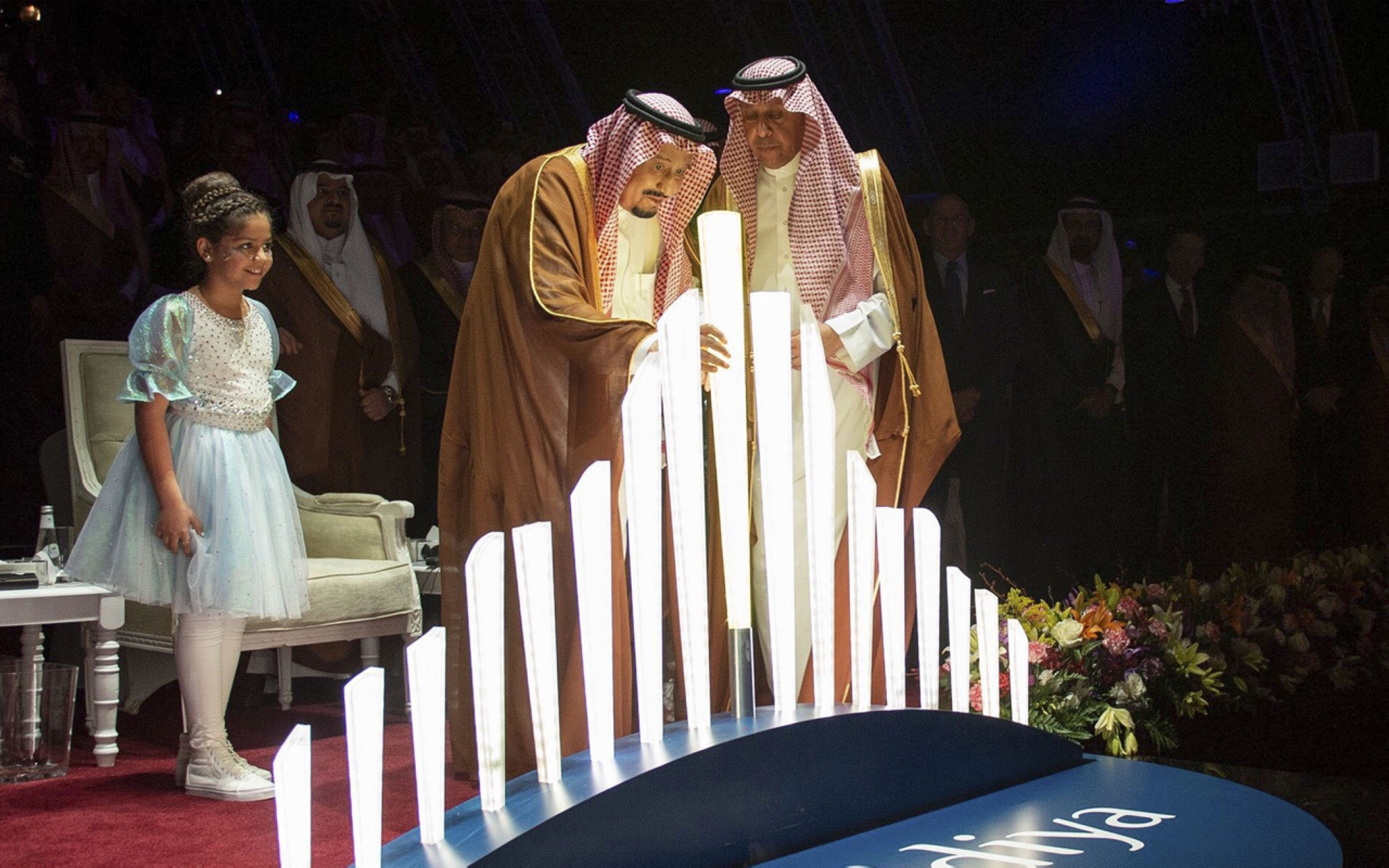
Tourism sector
The tourism sector witnessed rapid development during the reign of King Salman within the framework of Saudi Vision 2030. It is one of the economic enablers for Saudi Arabia, contributing, in turn, to further openness to the world, hosting visitors to get acquainted with the land, culture, and natural diversity of Saudi Arabia, and attracting investments. Saudi Arabia opened its doors to tourists from all over the world in September 2019 and launched tourist visas for citizens of forty-nine countries electronically. It issued about 440,000 tourist visas until March 2020. Obtaining an e-tourist visa takes between five and thirty minutes in most cases, while tourists from other countries have been allowed to apply for a visa at the nearest Saudi embassy or consulate. This has made the tourism sector in Saudi Arabia the fastest growing in the world, with a growth rate of 14 percent, and its direct and indirect contribution to the Saudi economy reached 9.5 percent.
Saudi Arabia chaired the first G20 tourism working group after its establishment, and several initiatives were unanimously adopted, including Diriyah Communique, AlUla Framework for Inclusive Community Development through Tourism, and a report on safe and seamless travel. The Saudi Tourism Authority was established to oversee the promotion of Saudi tourism locally and abroad. In May 2021, the first regional office of the United Nations World Tourism Organization was opened in Riyadh. The office works to coordinate policies and initiatives between thirteen countries in the Middle East, in addition to activating agricultural tourism in Saudi Arabia, which is one of the initiatives of the Ministry of Tourism to develop the national tourism industry associated with it and increase tourist trips to rural and agricultural areas in Saudi Arabia. Also, 102 licenses for agricultural tourism were issued in Riyadh, Qassim, Hail, Tabuk, Najran, al-Madinah al-Munawwarah, al-Ahsa, Jeddah, Taif, and other governorates affiliated with those provinces.
Saudi Arabia led the G20 countries in the rate of incoming international tourist flows during the first seven months of 2022, according to the latest reports issued by the World Tourism Organization, announced at the meeting of the G20 Tourism Ministers in 2022. According to the organization's report, Saudi Arabia achieved high results in the flow of incoming international tourists at a rate exceeding 121 percent, from January to July 2022. Saudi Arabia also achieved a new accomplishment within the Travel and Tourism Development Index (TTDI) issued by the World Economic Forum (WEF), jumping globally to the thirty-third place and advancing ten places in one go compared to 2019. According to the development index, the improvement in tourism in Saudi Arabia covered all five main axes, in addition to twelve sub-factors. With this, Saudi Arabia became the second highest country in the Middle East and North Africa within the index. It also came within the top ten countries in three axes, as it ranked first in tourism demand pressure, the economic impact of the sector, and its quality on the economy. It also ranked ninth globally in the level of priority of travel and tourism. This factor measures the extent to which the travel and tourism sector is prioritized at the local level by the public and private sectors. It also ranked tenth in the business environment. This indicator specializes in measuring the extent to which national policies support doing business.
Entertainment sector
As part of enhancing the quality of life in Saudi Arabia, Saudi Vision 2030 put in place a number of programs and initiatives aimed at improving the lifestyle of individuals and families and building a society where members enjoy a balanced lifestyle. Since mental well-being has an impact on achieving success and providing the most that an individual can provide for himself, his society, and his homeland, the Vision focused on making the lives of Saudi residents more vibrant and enriching, by engaging them in cultural, entertainment and sports activities that contribute to enhancing the quality of life for all. Based on that, a Royal Order was issued on May 7, 2016, to establish a 'General Entertainment Authority.' Regulations for the authority were adopted in 2016, to be the entity responsible for regulating the entertainment sector in Saudi Arabia by holding events and entertainment activities and encouraging the private sector to contribute to developing entertainment activities, in addition to attracting and training competencies to work in the entertainment field.
In a short period since the establishment of the entertainment system in Saudi Arabia, the entertainment sector has achieved accomplishments and prominent numbers that directly contributed to improving the quality of life for members of society and attracting visitors and tourists from different countries of the world, making entertainment in Saudi Arabia a distinctive landmark since its inception. According to the latest statistics issued by the General Entertainment Authority in 2023, the number of visitors to entertainment events in Saudi Arabia reached more than 120 million visitors, and the authority issued 11,136 licenses for various entertainment activities. The number of days for entertainment events reached 76,000 days, among other achievements.
According to the report issued by the United Nations Sustainable Development Solutions Network, which annually measures happiness indicators for about 156 countries around the world, Saudi Arabia continued its progress in the global happiness index, enhancing its position globally, ranking twenty-fifth in the global happiness index for 2022, despite the repercussions of the COVID-19 pandemic globally. Saudi Arabia ranked twenty-sixth globally in the 2021 report. The report's measurement indicators showed the steady progress of Saudi Arabia in the ranking of the happiest people from 2017 until 2022, in light of the progress in achieving the goals of Saudi Vision 2030, and the resilience of Saudi Arabia's capabilities to adapt to the requirements of developing quality of life in its various sectors.
Achievements in the religious and social fields
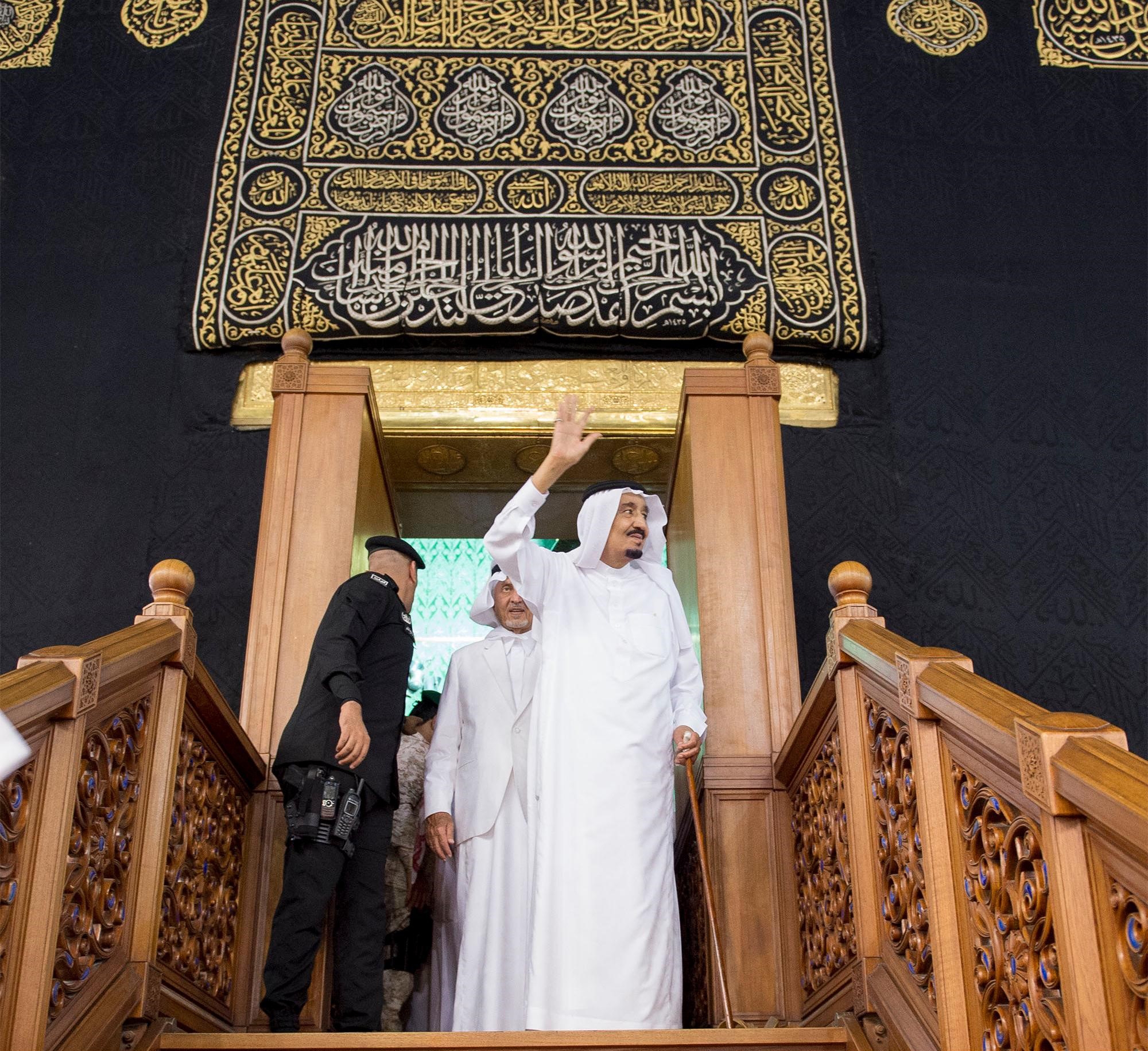
Religious field
During the reign of King Salman, Saudi Arabia maintained its care of the Holy Quran and the Sunnah of the Prophet. This dedication was reflected in its sponsorship of international Quran memorization competitions, held annually under the name of the Founding King, as well as sponsoring local Holy Quran memorization competitions bearing King Salman’s name.
Saudi Arabia also continued to provide services for the Two Holy Mosques and pilgrims. King Salman ordered the completion of the third Saudi expansion project of the Grand Mosque, aiming to increase its capacity from 670,000 to 1,287,474 worshipers. This expansion, the largest in the Grand Mosque’s history, extends approximately two hundred m from al-Kaaba al-Musharrafa’s center and reaches a depth of about 684 m. It features the expansion building, southern and northern bridges connecting to the Mataf building, service buildings, courtyards, and service building with a set of tunnels and pedestrian tunnels, and part of the first ring road encircling the Grand Mosque.
In 2015, five major projects were launched as part of the comprehensive third Saudi expansion of the Grand Mosque. These projects included the main expansion building, the courtyards, the pedestrian tunnels, and the central service station of the Grand Mosque. The third Saudi expansion features four minarets, each standing 135 m tall. Within the expansion building, there are twelve mobile domes and six fixed domes. A total of 680 escalators were installed throughout the project to facilitate visitor movement. Additionally, the Saudi corridor was developed, encompassing the Mataf expansion behind the Abbasid corridor. This corridor spans four levels: the ground floor, first floor, second-floor mezzanine, and the roof. The Saudi corridor now accommodates up to 287,000 worshipers and 107,000 circumambulators per hour, including those in the Mataf courtyard. Designed to meet high-quality engineering standards, the corridor offers expansive spaces for circumambulators and worshipers. It is equipped with technical and service services, and sound and lighting systems.
The third phase of the Prophet's Mosque expansion project has commenced, aimed at increasing the mosque's capacity while adding green spaces, canopies, women's prayer rooms, parking facilities, pedestrian walkways, and service outlets. This phase includes modernizing the mosque with cutting-edge technologies and enhancing health and humanitarian services by establishing a number of clinics, hospitals, and health centers around the mosque to provide medical, preventive, and therapeutic care for visitors and worshipers.
The King Salman Project to Expand Quba Mosque and the to develop its surrounding area has also been launched. It aims to increase the mosque's total area to fifty thousand m - ten times its current size - allowing it to accommodate up to 66,000 worshipers. This will mark the largest expansion in the history of Quba Mosque since its establishment in 622.
As part of its commitment to serving pilgrims, Saudi Vision 2030 introduced the Pilgrim Experience Program in 2019. The program is designed to facilitate the hosting of visitors to the Two Holy Mosques, offering them top-tier services while enriching their religious and cultural journeys, ensuring a profound spiritual experience for pilgrims and Umrah performers. The program designed the visitors' journey according to seven main points of contact, on which improvement and development services were focused. They start with before arrival, followed by arrival and departure, transportation, visiting the Two Holy Mosques and Holy Sites, performing rituals in health and safety, in addition to the hospitality and exploring Saudi Arabia.
Since its launch, the program, in partnership with relevant entities, has achieved significant milestones. Notably, it introduced electronic visas for Hajj and Umrah pilgrims from all countries and reduced visa processing time to just five minutes instead of fourteen days with high accuracy. The Umrah season has been extended, increasing the number of Umrah pilgrims from 7.42 million in 2018 to 24.7 million in 2022. There have been many other technological achievements like launching initiatives such as 'Eyab,' 'Smart Hajj,' 'Pilgrimage Without Bag,' and 'Eatmarna' app. Other accomplishments include comprehensive health insurance for pilgrims and the launch of the 'Road to Makkah' initiative. The program's achievements also included developing forty mosques and historic Islamic sites, establishing the 'Wifadah' e-learning platform for training and qualifying workers serving pilgrims, establishing the pilgrim reception center and follow-up and control room, and launching 'Kidana Development Company' in 2020 specialized in developing the Holy Sites in Makkah al-Mukarramah. Additionally. The Law Service Providers of External Pilgrims was approved.
Continuing the service of the Islamic religion by the kings of Saudi Arabia since its establishment, a Royal Order was issued on October 17, 2017, to establish a complex named 'Custodian of the Two Holy Mosques King Salman Bin Abdulaziz Al Saud Complex for the Prophet’s Hadith' in al-Madinah al-Munawwarah', given the significance of the Prophetic Sunnah for Muslims as the second source of Islamic legislation after the Holy Quran. King Abdulaziz Complex for Endowment Libraries was also established in al-Madinah al-Munawwarah by order of the Custodian of the Two Holy Mosques on June 20, 2016. The Royal Order stipulated transferring all holdings of the King Abdulaziz Public Library including endowment libraries, manuscripts, and rare books to the complex to be available for serving knowledge and learning.
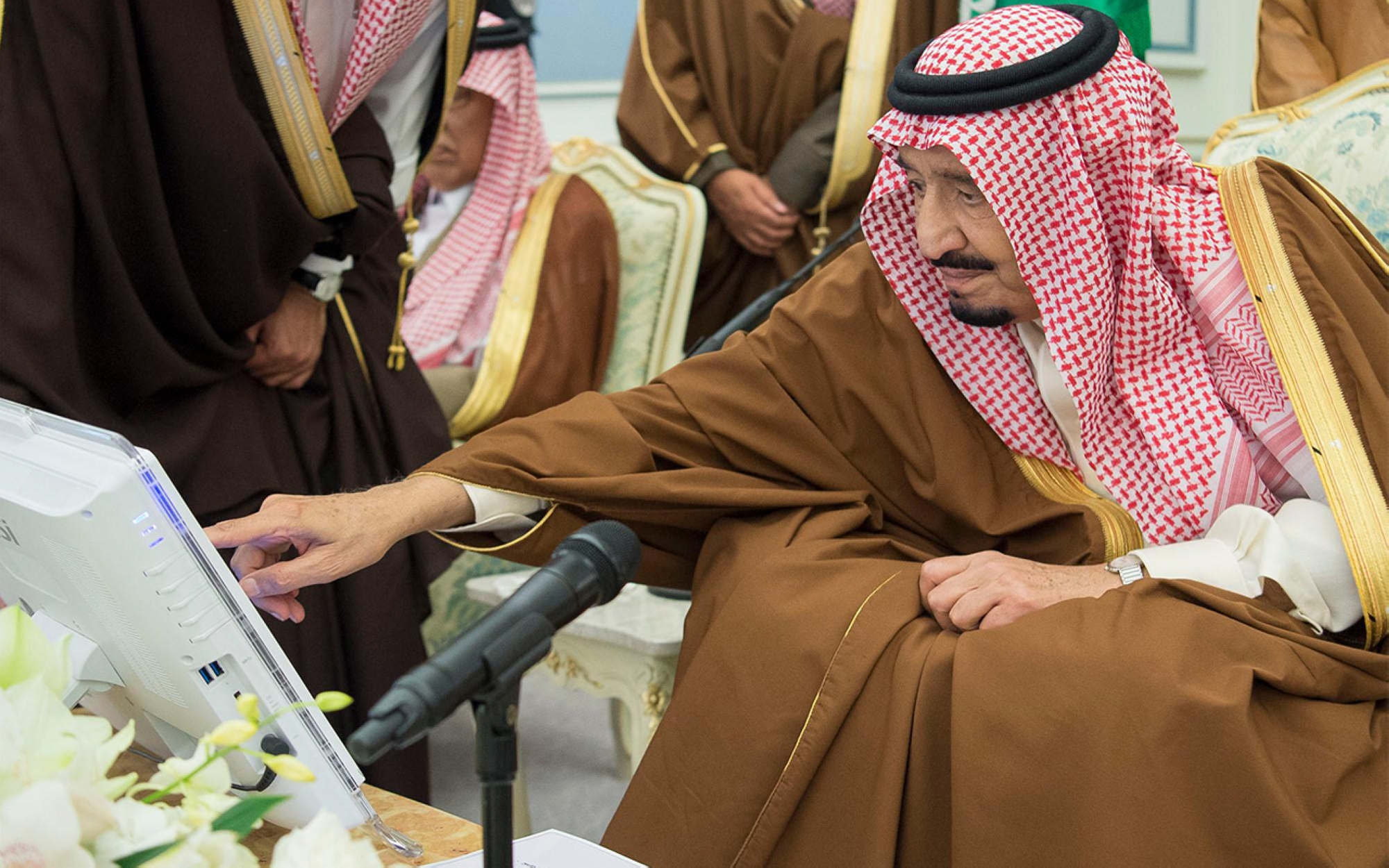
Social field
As part of the Saudi Vision 2030 realization programs, the Housing Program was launched in 2018 to create a vibrant environment for Saudi families and society as a whole. Since its inception, the program has focused on developing new standards for advancing the housing sector and enabling Saudi families to access diverse housing options and financing solutions that contribute to increasing the rate of first-time homeownership among Saudi households. The program has achieved several accomplishments since its launch, most notably streamlining ownership procedures by providing immediate eligibility for subsidized real estate loans rather than the previous waiting period of up to fifteen days after applying. There has also been growth in new residential real estate loans, which before the program's launch was around two thousand financing contracts per month, to thirty thousand families benefiting from new mortgage loans every month. This has helped strengthen supply and demand, increasing Saudi families’ homeownership rate from 47 percent in 2016 to over 60 percent in 2020.
Several entities supporting the housing system have also been established, including the National Housing Company as an investment arm of the housing system, the Saudi Real Estate Refinance Company, which contributes to providing liquidity and expanding financing solutions, the Real Estate General Authority aiming to organize and develop non-governmental real estate activity, and the Saudi Real Estate Institute representing the academic arm in the housing system for training and qualifying national competencies and raising the level of professionalism in providing real estate services. In addition, transforming the Real Estate Development Fund into a financing institution to make it one of the largest development funds in Saudi Arabia and linking it organizationally to the National Development Fund, establishing the Etmam Center to serve real estate developers and facilitate their procedures to unify efforts between relevant government entities and expedite procedures, operating the Saudi Real Estate Arbitration Center to be the specialist in resolving real estate disputes, and establishing the Housing Data and Monitoring Center, which monitors, analyzes and studies the housing sector in Saudi Arabia.
The National Development Fund was established by a Royal Order on October 3, 2017, to elevate the performance level of development funds and banks to attain the main goals of their inception and keep pace with what serves development priorities and economic needs. It is the entity responsible for the general regulatory and oversight supervision of development funds and banks in Saudi Arabia. The National Program for Community Development 'Tanmiah' was also established in 2018 to achieve sustainable community development for residents in areas of development projects and raise the standard of living for community members, building the future according to local laws and international standards, in partnership with government, private, and non-profit entities. The program has also set integrated standards in community development that prioritize human rights above all, and enable people to have a decent life and stable environment.
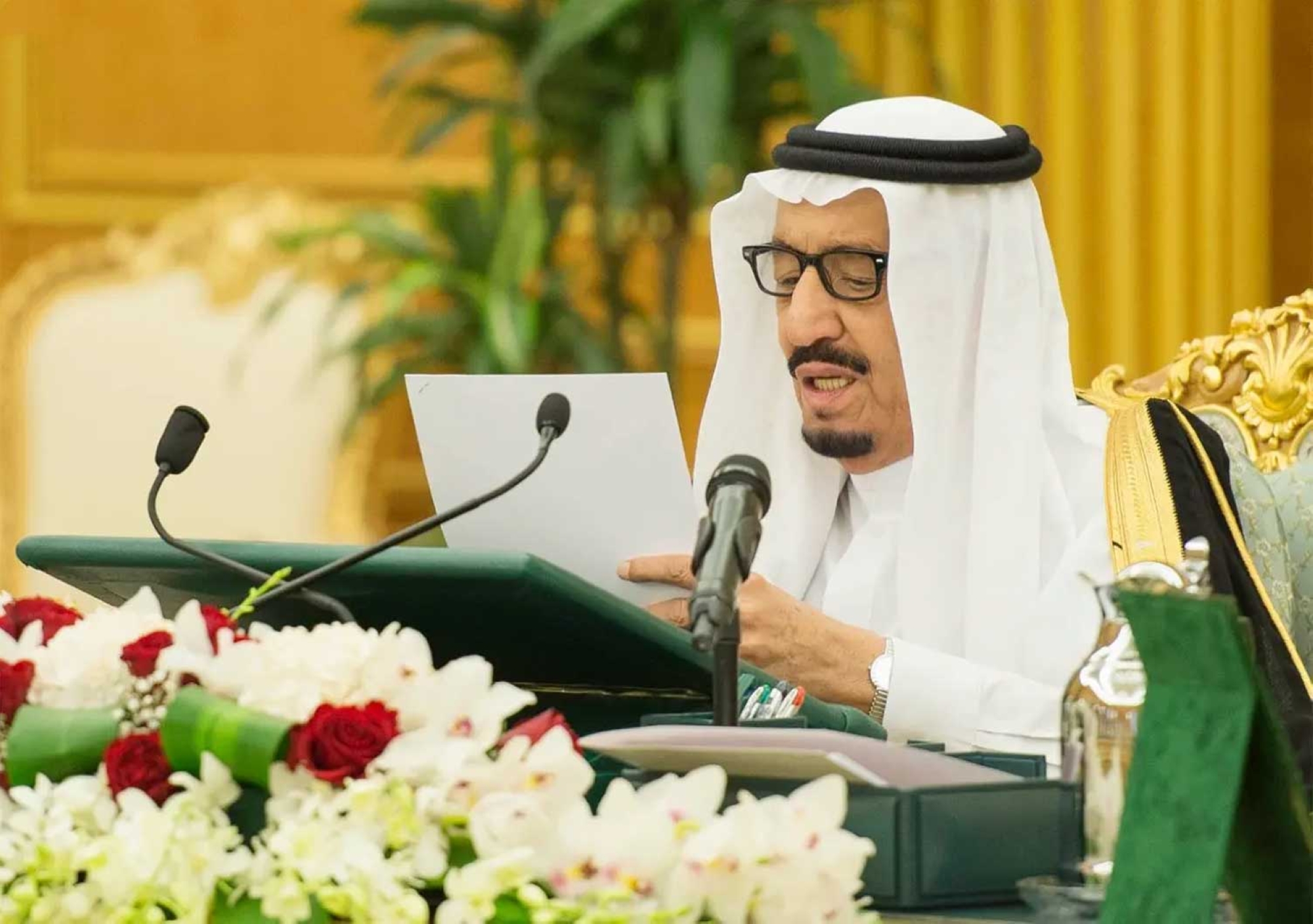
Historical decisions during the reign of King Salman
Saudi Vision 2030
In the reign of King Salman, Saudi Vision 2030 was developed, under the leadership of Crown Prince and Prime Minister His Royal Highness Prince Mohammed Bin Salman Bin Abdulaziz, to shape the future of Saudi Arabia. It is a national transformation plan that focuses on activating Saudi Arabia's strengths as the land of the Two Holy Mosques, the heart of the Arab and Islamic world, investing the country's huge economic capabilities to create a diversified and sustainable economy, and optimally utilizing the strategic geographical location of Saudi Arabia as a hub connecting three continents and home to the most significant maritime passages, in addition to leveraging its diverse and rich history spanning thousands of years.
Saudi Vision 2030 is built around three main pillars: a vibrant society, a thriving economy, and an ambitious nation. It has ninety-six strategic objectives divided into priority levels, supported by supportive programs called Vision Realization Programs: the Human Capability Development Program, the National Industrial Development and Logistics Program, the National Transformation Program, the Pilgrim Experience Program, the Privatization Program, the Public Investment Fund Program, the Quality of Life Program, the Financial Sector Development Program, the Fiscal Sustainability Program, the Health Sector Transformation Program, and the Housing Program.
In 2024, Saudi Arabia was awarded the bid to host Expo 2030 in Riyadh City, underscoring the international community's trust and Saudi Arabia's capacity to host major global events. This further strengthens Saudi Arabia's standing as a leading global hub for business, tourism, and innovation.
Operation Decisive Storm
King Salman launched the Operation 'Decisive Storm' coalition, a military Arab coalition to protect the legitimate government in Yemen against the coup by the Houthi militias. The first airstrikes were launched on March 26, 2015, with the strategic objective of preventing the Houthis from possessing any dangerous advanced weapons, halting Houthi expansion internally in Yemen, and providing strong support to the legitimate government. Saudi Arabia also led Operation 'Restoring Hope,' the second phase of Operation Decisive Storm, launched to achieve economic and social development for the Yemeni people, protect civilians, facilitate the evacuation of foreign nationals from Yemeni territory, intensify humanitarian and medical aid to the Yemeni people, make way for international efforts to provide humanitarian assistance, counter any military movements by the Houthi militias, continue imposing air, land, and sea blockades, and increase oversight to prevent arming the Houthis, according to the UN resolution.
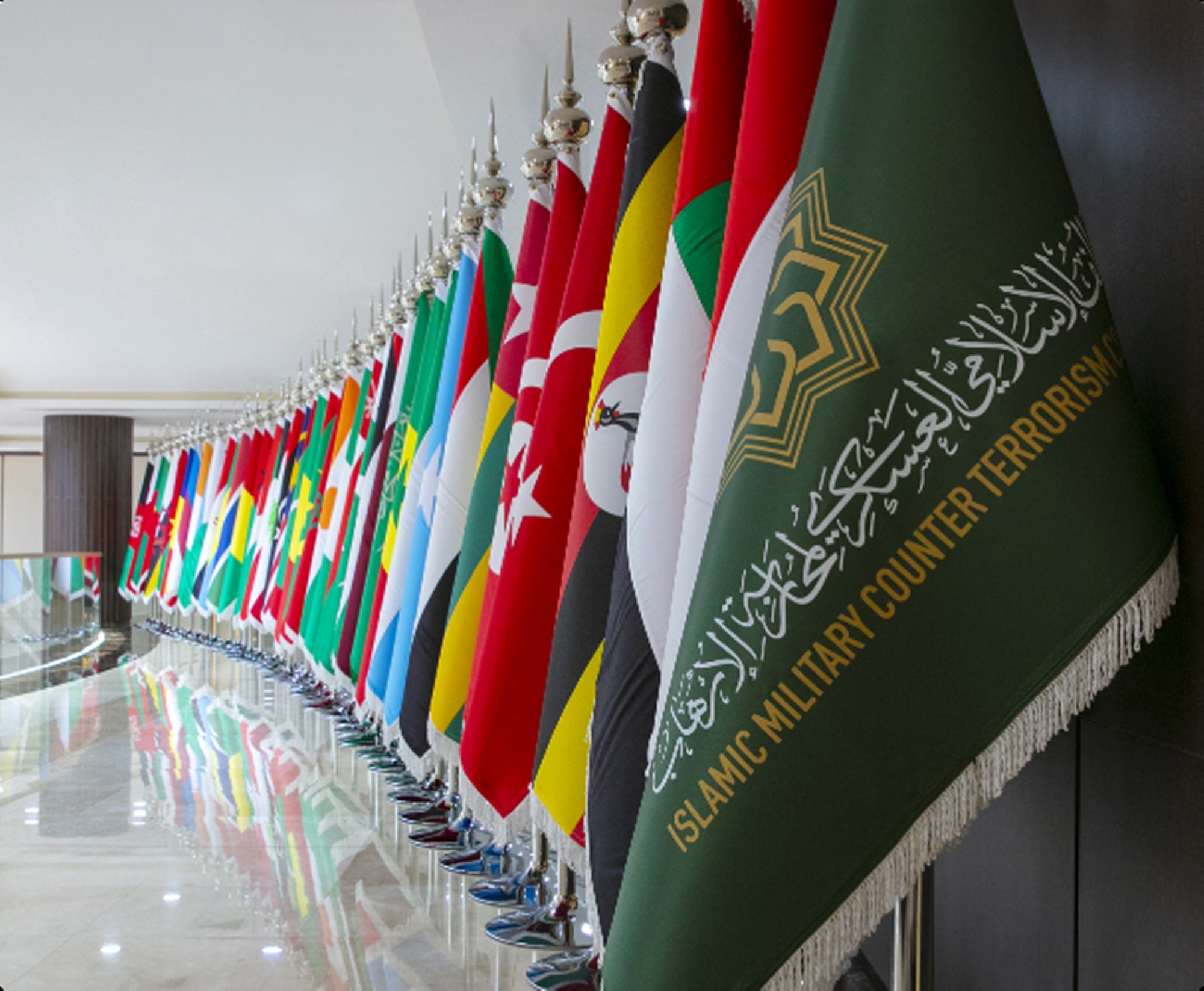
The Islamic Military Counter Terrorism Coalition
The Islamic Military Counter Terrorism Coalition was formed on the initiative of Saudi Arabia and announced by His Royal Highness Prince Mohammed Bin Salman, crown prince and prime minister, in December 2015, to unify the efforts of Islamic countries in confronting terrorism. The coalition is based on strategic objectives centered around combining intellectual and educational efforts to deconstruct the ideologies of terrorist thought, highlight the tolerant Islamic principles and values, manufacture a joint media discourse to raise public awareness about the dangers and implications of terrorism, counter campaigns promoting terrorism, prepare effective measures that enhance prevention and detection operations, limit terrorist financing, coordinate military and relief support for member states affected by armed terrorist groups, to enable defeating them and alleviate the suffering of populations.
Supporting human rights during the reign of King Salman
Legal and judicial reforms
The reign of King Salman has witnessed legal and judicial reforms aimed at enhancing social reform entrenching the principles of justice and protecting human rights. Under King Salman's reign, the judicial system has made significant strides, resulting in comprehensive sectoral development. This includes strengthening the institutionalization and independence of the judiciary, modernizing litigation procedures, establishing key judicial principles, digitizing judicial services, and enhancing the satisfaction rate among beneficiaries of these services.
On April 9, 2019, the Council of Ministers issued a regulation on the preservation of public taste. To further develop the legislative environment in Saudi Arabia, His Royal Highness Prince Mohammed Bin Salman, crown prince and prime minister, announced the specialized legislation system on February 8, 2021. It includes four draft laws: the Personal Status Draft Law, the Civil Transactions Draft Law, the Penal Draft Code for Discretionary Sanctions, and the Evidence Draft Law.
During King Salman's reign, Saudi Arabia has introduced numerous amendments and reforms in this field, which have helped meet national priorities and international obligations. These efforts have promoted and protected human rights locally and included Saudi Arabia's accession to various international human rights agreements. Additionally, an authority directly linked to the Custodian of the Two Holy Mosques was established to further protect and advance human rights.
Women empowerment
King Salman led several efforts to empower women, contributing to enhancing their participation through legislative reforms that preserve women's rights as full citizens. In his first year of rule, the first municipal elections were held in December 2014 - January 2015, in which women participated as voters and candidates. Women were also allowed to drive cars and obtain driving licenses, with the decision taking effect on June 24, 2018. Additionally, they were permitted to start their own businesses and benefit from government services without the need for a guardian's approval. Women were also allowed to enter sports stadiums and assume a number of leadership positions inside Saudi Arabia and abroad, with their participation increasing in most administrative, economic, political, and human rights fields. Women were given a pivotal role in Saudi Vision 2030 programs, and their participation rate in the labor market was increased. Travel documents, civil status, and labor laws were amended in service of women. On August 2, 2019, women were granted many rights, including the ability to obtain a passport alone without the need for a guardian's consent, and the possibility to travel after reaching the age of twenty-one. The recent amendments equated women's rights with men's in terms of employment, and modifications were made to the Labor Law to grant women more rights.
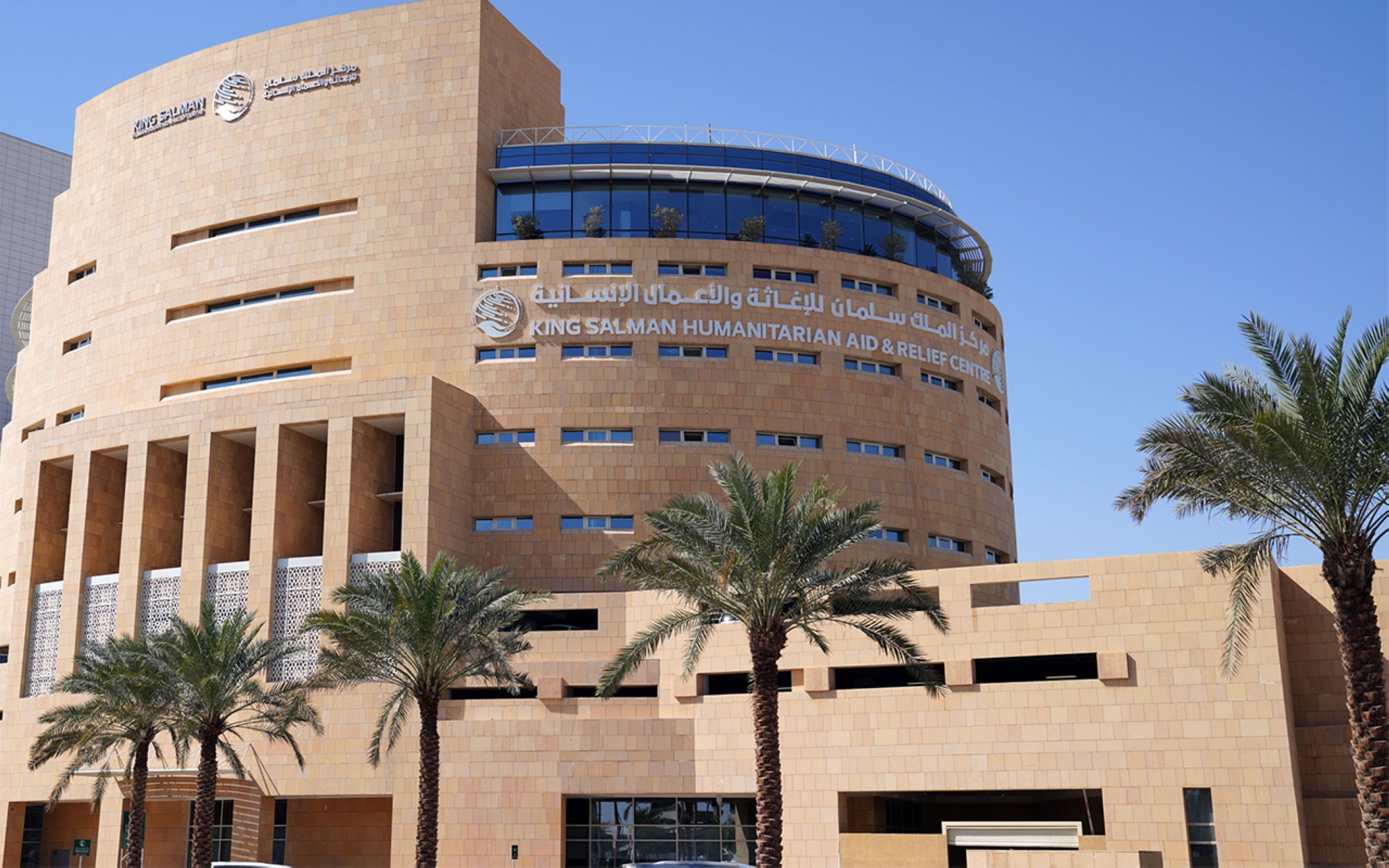
Aspects of King Salman's life
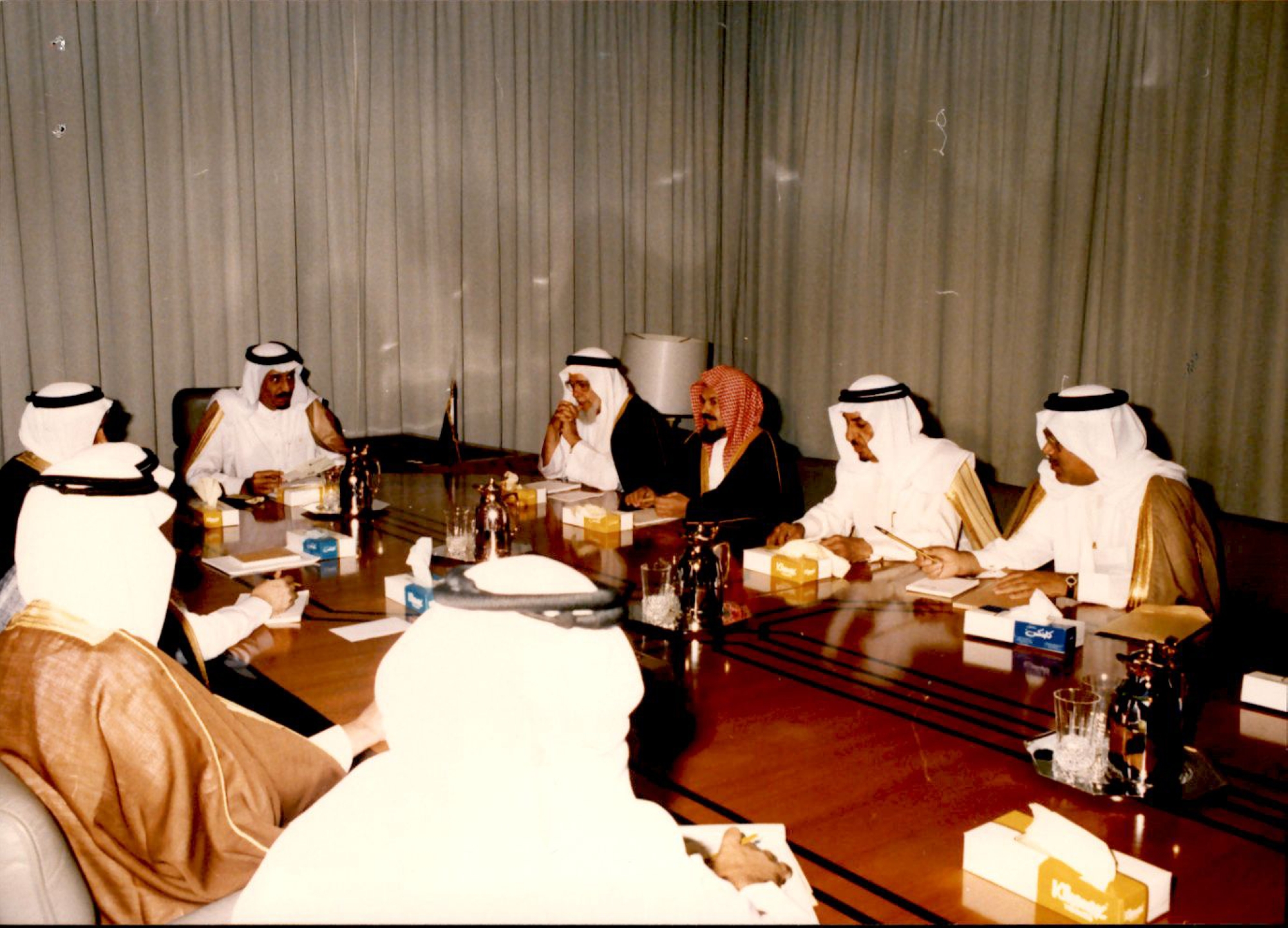
Humanitarian work
King Salman is known as a philanthropist and founder of humanitarian projects in Saudi Arabia. He has helped solidify concepts of social solidarity and develop capabilities to achieve a better life based on noble principles. He crowned his charitable efforts by establishing the King Salman Humanitarian Aid and Relief Center, which is the humanitarian arm of Saudi Arabia, and the only entity authorized to receive monetary and in-kind donations domestically and deliver them to needy groups abroad. The center also supervises and organizes Saudi foreign charitable works and licenses local charities to work abroad. It has established governance for humanitarian work, ensuring donations are not used for unintended purposes. It also monitors and evaluates humanitarian efforts and participates in research and studies related to these matters.
During the reign of King Salman, Saudi Arabia led the donor countries in the field of providing Official Development Assistance (ODA), both humanitarian and developmental, to low and middle-income countries. Saudi Arabia has contributed an amount of SAR26.71 billion, according to data published by the Development Assistance Committee of the Organization for Economic Co-operation and Development (OECD) on Wednesday, December 21, 2022.
King Salman has chaired over twenty-five cultural, humanitarian, and governmental associations and institutions. He has received twenty-four medals, thirteen honorary doctorates from Saudi, Arab, and Islamic universities, the United Nations Award for Reducing Poverty in the World, the Order of King Abdulaziz (First Class), and several local and international awards, most notably the King Faisal Prize for Service to Islam.
King Salman showed interest in charitable housing in Riyadh City early on, leading to the establishment of a housing district west of Riyadh City. This initiative was later renamed the King Salman Charity Housing Association.
King Salman chaired several Saudi relief committees over the past decades. He led committees for donations to the victims of the Suez crisis in Egypt and the Republic of Algeria in 1956, provided relief to the victims of the Pakistan disaster in 1973, supported military efforts in Egypt and Syria in 1973, assisted the families of martyrs in Jordan in 1976, provided relief to flood victims in Sudan in 1988, sheltered Kuwaiti citizens following the Iraqi invasion of Kuwait in 1990, and donated to flood victims in Bangladesh in 1991.
Interest in culture, history, and heritage
King Salman is known for his great interest in culture. Since his early youth, he has been passionate about books and reading. He has been close to intellectuals and authors in Saudi Arabia and abroad. History has received the largest share of King Salman's readings. He has paid special attention to this area, specifically regarding the history of the Saudi state and its three stages, as he sees it as a major component of the entities that make up the Arabian Peninsula. This represents an integral part of the history of Arabs, Arabism, Islam, and Muslims for King Salman. This has earned him the title of Prince of Historians or Friend of Historians. Due to King Salman's love of history, historians, and old and modern historical narratives, he has been interested in everything related to heritage, arts, and literature in Saudi Arabia and abroad. This led him to chair the board of the King Abdulaziz Foundation for Research and Archives (Darah) (formerly) and oversee its development into one of the important and prominent institutions concerned with collecting and documenting the civilizational heritage of Saudi Arabia, its rulers, scholars, and historians. King Salman's interest and support for history and heritage was not limited to Saudi Arabia alone but also extended to a number of societies in the Gulf Cooperation Council (GCC) countries, including the Geographical Society and the Society for History and Archaeology.
Driven by his keen interest in and support for historical studies, King Salman established the King Salman Prize and Grant for Studies and Research of the History of the Arabian Peninsula. This program includes various awards for books, scientific articles, master's theses, and doctoral dissertations, as well as a number of research grants that aim to stimulate scientific research in the field of history and civilization and to enrich the Arab library with the history, archaeology, and heritage of the Arabian Peninsula. King Salman is considered a reference in the history, geography, and society of Saudi Arabia and the Arabian Peninsula. He has contributed to establishing and developing a number of heritage institutions in Saudi Arabia, as well as several heritage and cultural initiatives, including the King Abdulaziz Foundation for Research and Archives (Darah), established in 1972; King Fahd National Library, established in 1989; Tuwaiq Heritage Palace at the Diplomatic Quarter in Riyadh, established in 1982; the Custodian of the Two Holy Mosques King Salman Prize and Grant for Studies and Research of the History of the Arabian Peninsula established in 2005; Riyadh Yesterday and Today Exhibition and Riyadh International Book Fair, a cultural festival established in 2006.
King Salman's Children
King Salman married multiple wives, including Princess Sultana Bint Turki al-Sudairi, Princess Fahda Bint Falah Al Hathleen, and Princess Sara Bint Faisal Abu Ithnayn. He has twelve sons and one daughter: Fahd (deceased), Sultan (Advisor to the Custodian of the Two Holy Mosques), Ahmed (deceased), Abdulaziz (Minister of Energy), Faisal (Special Advisor to the Custodian of the Two Holy Mosques, Chairman of the Board of Directors of the King Abdulaziz Foundation (Darah), Chairman of the Board of Trustees of the King Fahd National Library), Hassa, Mohammed (Crown Prince and Prime Minister), Saud, Turki, Khalid (Minister of Defense), Nayef, Bandar, and Rakan.
King Salman's personal library
King Salman has been interested in reading since childhood, and it has remained an important part of his daily routine and his favorite hobby. He has a personal library at his home that he established when he first developed an interest in reading. The book collection grew over time and is now considered one of the most important libraries in Saudi Arabia. It contains rare books, manuscripts, and specialized sources and references on the history of the Arabian Peninsula in general and Saudi Arabia in particular, as well as seminal works in Sharia, linguistics, biographies, travelogues, memoirs, encyclopedias, academic dissertations, periodicals, and literature and poetry, totaling 27,000 titles and 120,000 volumes. King Salman's personal library consists of two main halls and a third separate hall dedicated to reading, made of sandalwood.
King Salman stands out as a history passionate and researcher within the Saudi royal family. His interest in the history of Saudi Arabia earned him the title of 'King of Historians.' His dedication to preserving the nation's history and heritage continues. This was reflected in his sons, who share his enthusiasm for this field. King Salman has authored several books on Saudi history and made historical contributions to local, Gulf, Arab, and international media.
King Salman has authored a number of books on Saudi history, including: Human Features from the Biography of King Abdulaziz Bin Abdulrahman Al Saud and The Historical and Intellectual Foundations of the Saudi State.
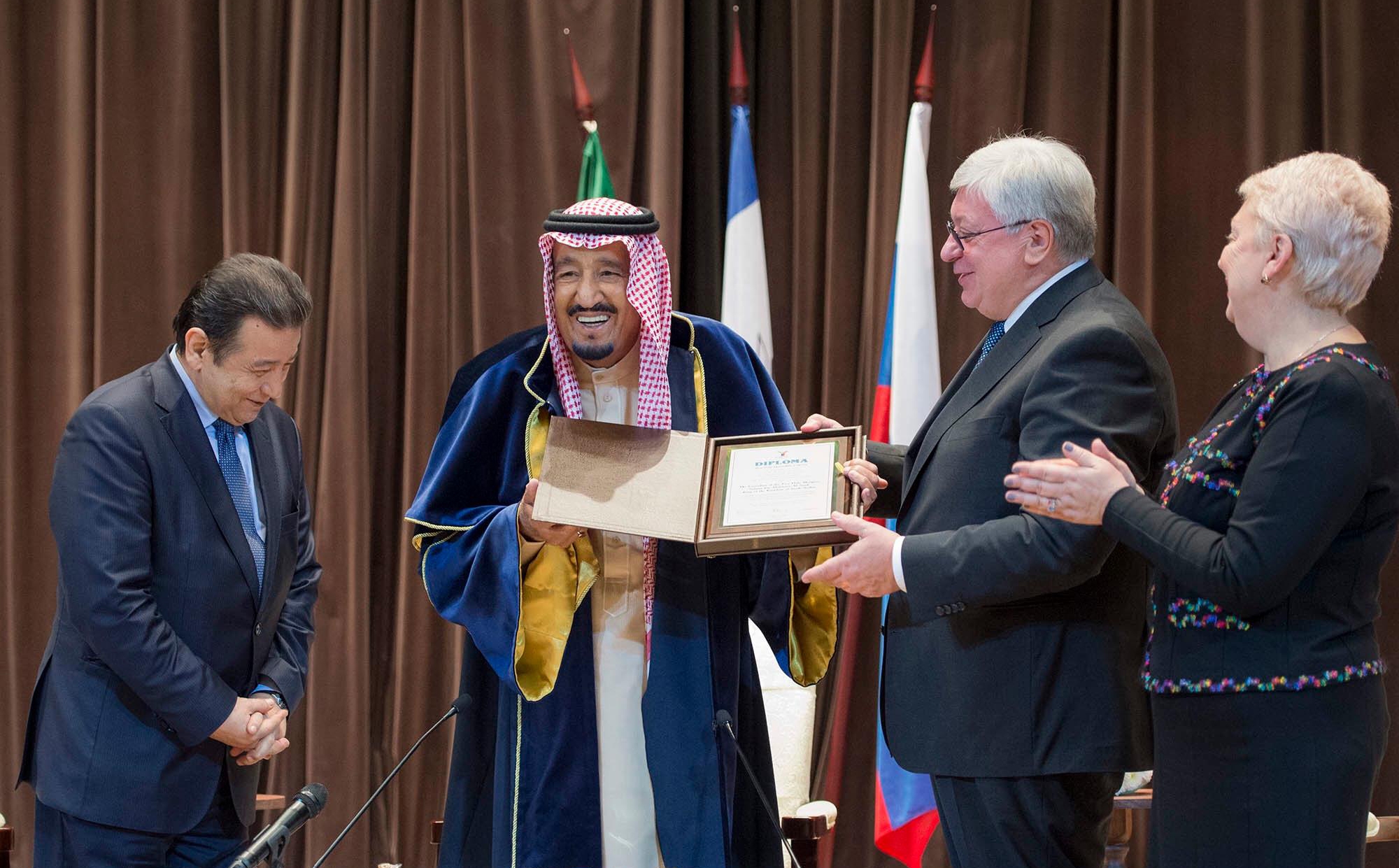
King Salman's awards and honors
Honors
- Honorary Doctorate in the history of the Saudi State from the Islamic University in al-Madinah al-Munawwarah, March 29, 2011.
- Honorary Doctorate in Arts from Umm al-Qura University in Makkah al-Mukarramah, March 29, 2008.
- Honorary Doctorate in Historical and Civilizational Studies from King Saud University in Riyadh, March 22, 2016.
- Honorary Doctorate in Promoting Islamic Unity from King Abdulaziz University in Jeddah, May 25, 2016.
- Honorary Doctorate in Service of the Holy Quran and its Sciences from Imam Mohammad Ibn Saud Islamic University in Riyadh.
- Honorary Doctorate from Jamia Millia Islamia University in Delhi, India, April 14, 2010, in recognition of his humanitarian and charitable efforts.
- Honorary Doctorate in Law from Waseda University in Japan, February 22, 2014.
- Honorary Doctorate in International Relations from Moscow State University, October 7, 2017.
- Honorary Doctorate from Cairo University in Egypt, April 11, 2016.
- Honorary Doctorate in Political Science (Service to Islam and Moderation) and Award for Outstanding Achievement in Service to Islam and the Ummah from the International Islamic University Malaysia, February 28, 2017.
- Honorary Doctorate in Science from the University Sarajevo School of Science and Technology, Bosnia, October 31, 2013.
- Honorary Doctorate in Arts from the University of Malaya in Malaysia, February 27, 2017.
- Honorary Doctorate from Peking University in China, March 17, 2017.
- Baden Powell Scouting Fellowship in Sweden, February 2008.
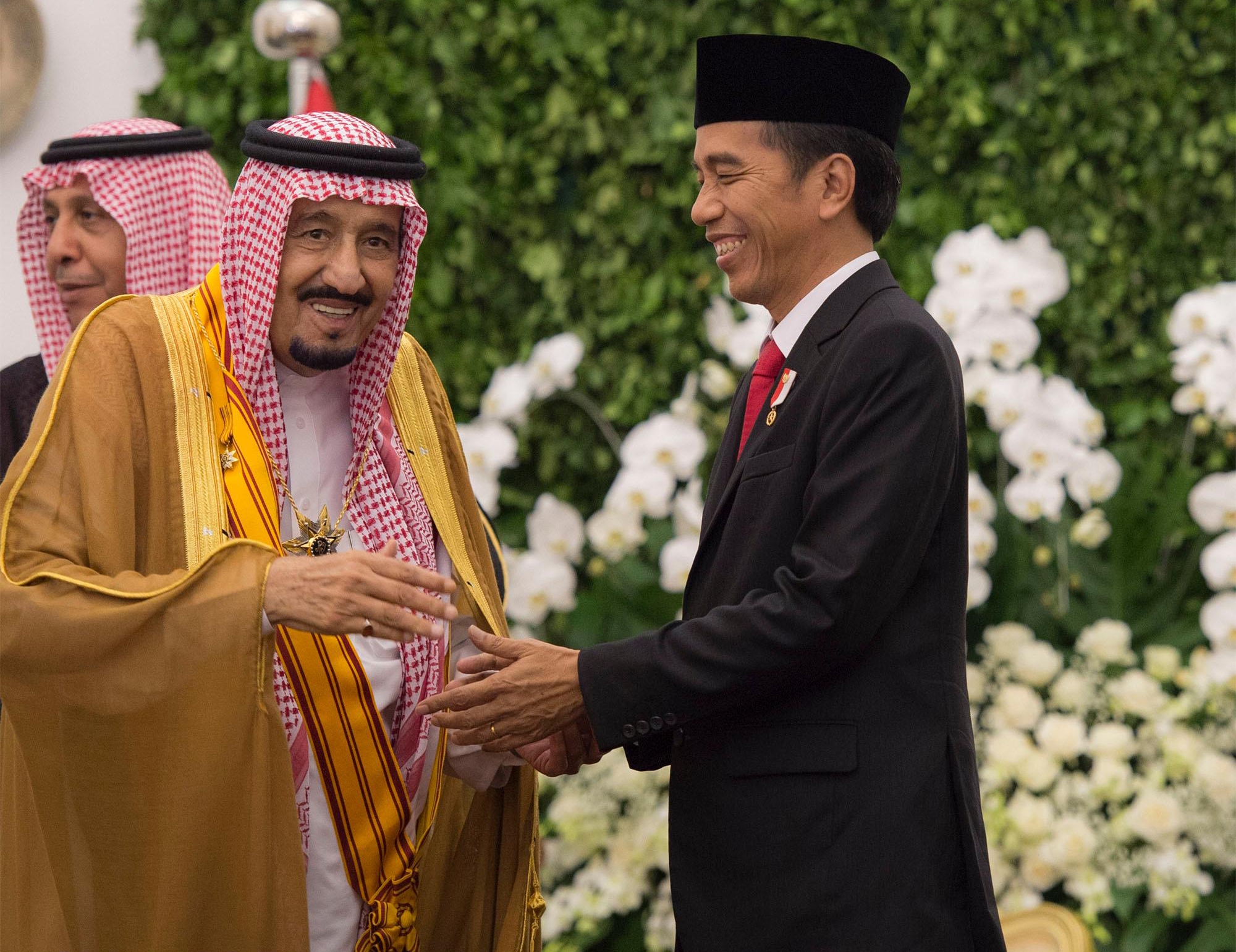
Orders
- Medal on the two-thousandth anniversary of the founding of Paris in 1985.
- Order of Intellectual Efficiency of Morocco in Casablanca, 1989.
- Order of al-Hussein Bin Ali, the highest order of the Hashemite Kingdom of Jordan.
- Order of Mubarak the Great, the highest order of the State of Kuwait, 2016.
- Order of the Nile, the highest order of the Arab Republic of Egypt, April 2016.
- 'Kent' Medal from the Berlin-Brandenburg Academy of Sciences and Humanities, May 2, 2010.
- Order of the Golden Lily of Bosnia and Herzegovina, March 1997.
- The Bosnian Medal for Islamic Benevolence of the first class, Sarajevo, January 2010.
- Order of the Star of Al-Quds, 1998.
- Order of Sikatuna, the highest order of the Republic of the Philippines, 1999.
- Order of the Republic of Greece.
- Collar of the order of the Aztec Eagle, the highest order of the United Mexican States.
- Grand Collar, the highest order of the State of Palestine.
- Order of Prince Yaroslav the Wise, First Class, the highest state order of Ukraine, November 1, 2017.
- The National Order of Mali, April 18, 2017.
- Order of the Republic, the highest order of Turkey, April 12, 2016.
- Order of Merit, the highest order of the Republic of Senegal, July 1999.
- Order of Unity from Yemen, May 2001.
- National Order of Merit, the highest order of the Republic of the Niger.
- First Degree Order of the Arab Parliament, May 2015.
- Order of the Grand Star of Djibouti, October 17, 2015.
- Order of the Green Crescent Moon, Greatest Crescent Grade.
- Order of Zayed, the highest order of the United Arab Emirates.
- The First Class State Order 'Order of the Crown', which is the highest Malaysian honor, February 26, 2017.
- Star of the Republic of Indonesia, the highest order of the Republic, March 1, 2017.
- The Royal Family Order of the Crown of Brunei Darussalam, March 4, 2017.
- Prince Naif Medal for Arab Security of the Excellent Class, April 5, 2017.
- Decoration of Honor from Sierra Leone, May 7, 2017.
- Order of King Abdulaziz, First Class.
- United Nations Award for Reducing Poverty in the World, 1997.
Awards
- Award of Disabled Children Association in Saudi Arabia for Humanitarian Service, 1995.
- Bahrain GCC Humanitarian Work Prize, 2008.
- The Special Olympics International Award for the Middle East and North Africa region for services to individuals with disabilities and promoting scientific research in the field of disability, December 2009.
- The Honorary Leadership Personality Award in the field of orphan care, presented during the Sanabel award ceremony for social responsibility of orphan care institutions in the Gulf states, in 2017.
- The Unique Outstanding Achievement Award granted by Sultan Ahmad Shah, Sultan of the Malaysian state of Pahang.
- King Faisal Prize for Service to Islam from King Faisal Foundation, January 1, 2017.
Entities Named After King Salman
- King Salman Humanitarian Aid and Relief Center (KSRelief).
- King Salman Science Oasis (KSSO).
- King Salman Global Academy for Arabic Language.
- King Salman Center for Disability Research (KSCDR).
- King Salman Air Base (KSAB).
- King Salman International Airport (KSIA).
- King Salman Bin Abdulaziz Center for Historical Materials Conservation (Tarmeem).
- King Salman Center for Studies of History of Arabian Peninsula and its Civilization.
- King Salman Social Center (KSSC).
- King Salman Charter for Architecture and Urbanism.
- King Salman Global Maritime Industries Complex (KSICMS).
- King Salman Bin Abdulaziz Royal Natural Reserve (KSRNR).
- King Salman Energy Park (SPARK).
- King Salman International Award for Disability Research.
- King Salman Award and Grant for Studies and Research on the Arabian Peninsula History.
- King Salman Road, north of Riyadh City.
- King Salman International Stadium.
- King Salman Charity Housing Association.
Related quizzes
Related articles


